Trip Report & Itinerary: Memorable Two Days in Hakone
In May 2023, we spent three days and two nights in Hakone, and we are excited to share the highlights of our trip with you. We’ll also share our actual two-day itinerary in Hakone with all the travel details and tips we picked up along the way to help you plan your own trip. Overall, our visit was filled with beautiful sights, cultural experiences, and delicious food. It was a memorable trip, and we would highly recommend Hakone as a destination for anyone looking to experience traditional Japan in a picturesque setting.
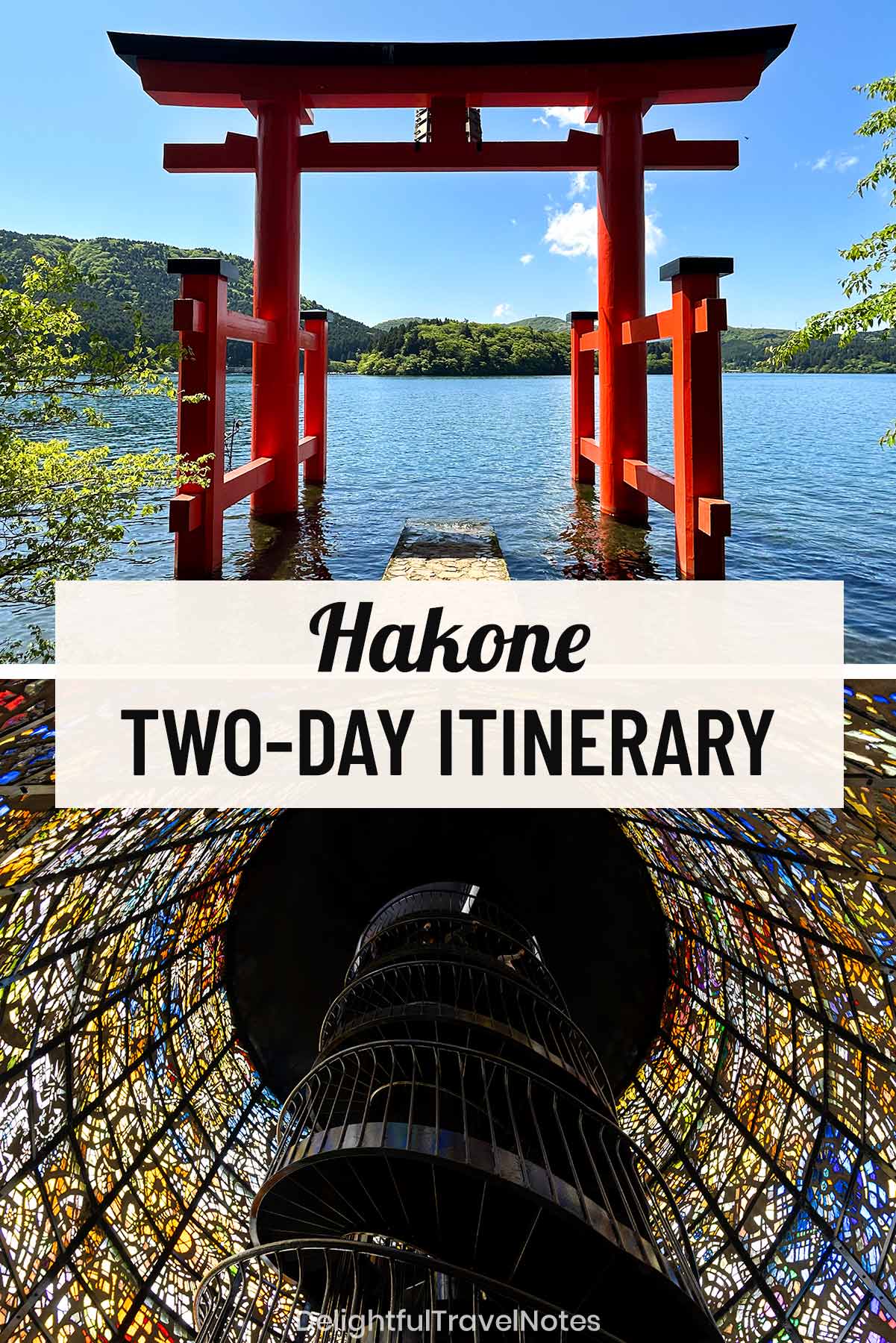
Hakone is a popular destination with both domestic and overseas tourists. While many visitors opt for a day trip from Tokyo to Hakone, we decided to spend almost 48 hours (two full days) from May 15th – 17th in Hakone.
After four days in Kyoto, we traveled to this onsen resort town while maintaining a relaxed pace to give ourselves enough time to soak in the experiences. There were still places we didn’t get to visit, nevertheless, we had a wonderful time and would not hesitate to return.
Another small note is that we stayed at two different accommodations during our trip. We booked the Hyatt Regency Hakone for the first night and Madoka no Mori ryokan for the second night. Since we planned to dedicate a whole day to sightseeing, we felt that staying in a ryokan on that day might not allow us to fully enjoy the unique experience it offered. Additionally, finding availability for two consecutive nights at a ryokan was a bit more challenging.
Day 1
Travel and Arrival
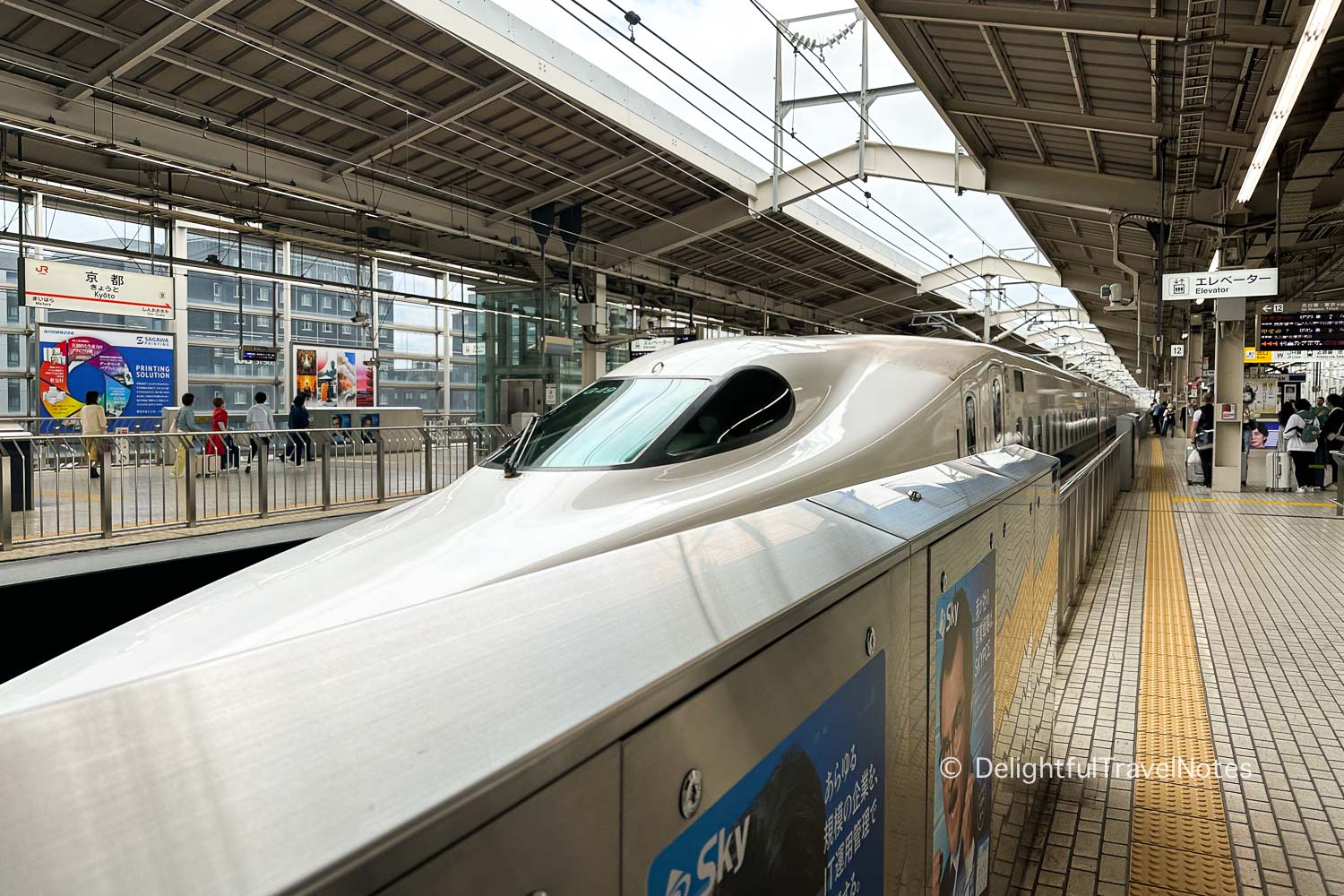
We left our accommodation at the Celestine Gion Hotel for Kyoto station in the morning. After quickly grabbing a salmon ekiben (station bento) at the station, we boarded the 8:33 am Hikari shinkansen train to Odawara. Please note that not all shinkansen trains on the Tokaido line will stop at Odawara station.
We booked green car seats on the Hikari train. These seats were spacious and comfortable, and the car had few passengers. We enjoyed the ekiben during the smooth ride. The changing views outside the window somewhat gave us a sense of Japan’s diverse landscapes and cultures.
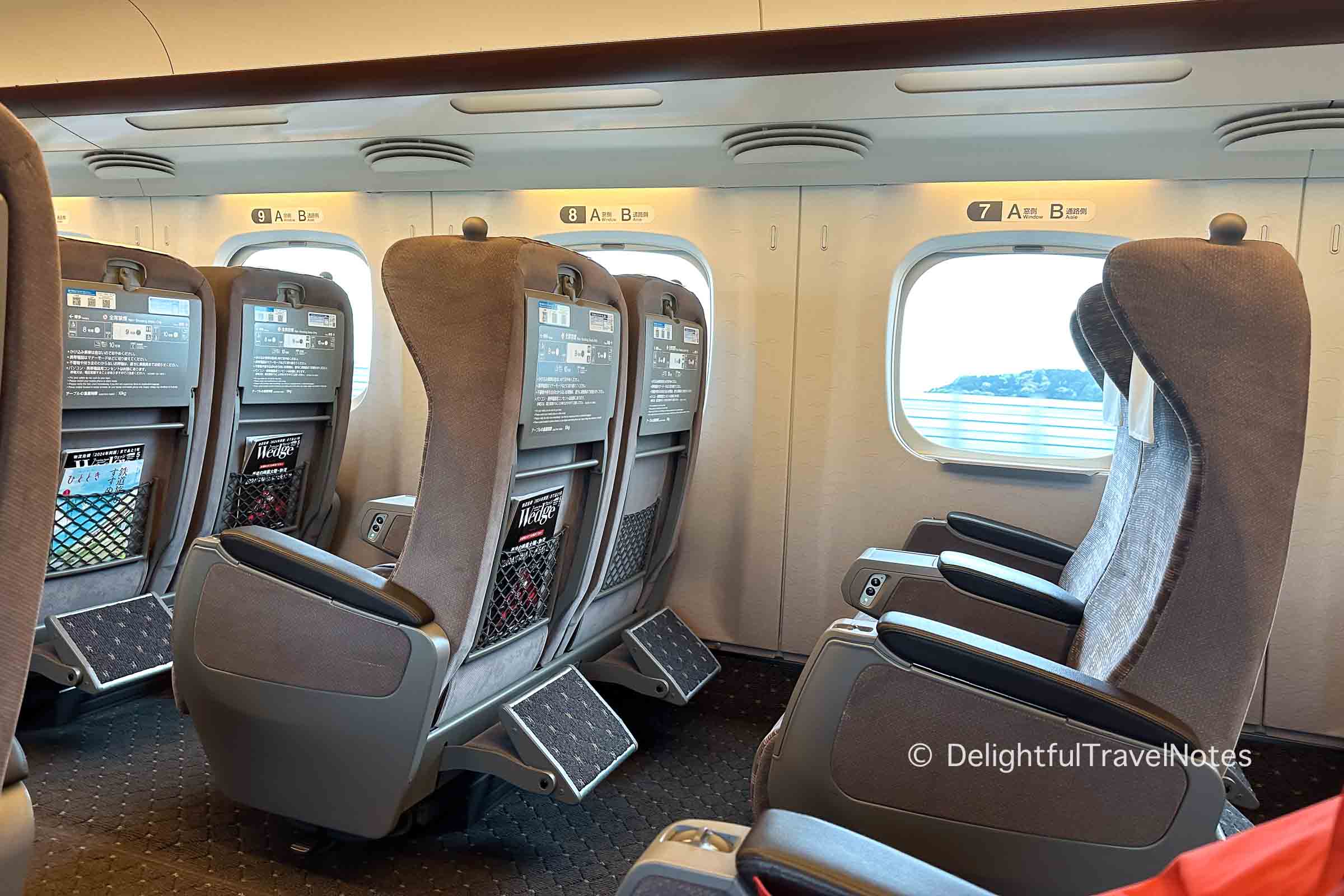
Unfortunately, due to cloudy weather, we were unable to catch a glimpse of Mount Fuji from the train. If you want to try your luck, make sure to book seats on the mountain side (which are C and D in green cars).
After reaching Odawara station at around 10:30 am, we took a taxi directly to Hyatt Regency Hakone Resort & Spa, which cost around 6,500 yen. We didn’t purchase Hakone pass since we planned to use taxis for most of our transportation in Hakone as we felt it would be more efficient. I read that the buses in the area could be unreliable and crowded sometimes.
Check Availability of Hyatt Regency Hakone
Agoda.com Booking.com
However, if you don’t mind allocating time for public transit, it can be quite fun since you will be able to experience different modes of transportation in Hakone, including the Hakone Tozan Railway, Hakone Ropeway, Hakone Sightseeing Cruise, and local buses. In that case, I recommend getting a Hakone pass.
During our taxi ride, we weren’t really impressed with the Hakone-Yumoto area, which seemed crowded with traffic. Gora felt more serene and closer to nature, and we were glad to choose Gora for our stay.
Hakone Open Air Museum
After arriving at the Hyatt Regency Hakone, we were informed that early check-in was not available, so we dropped off our luggage and had curry udon at Paseo Cafe nearby for a quick lunch. We then took the Hyatt’s free in-town shuttle to the Hakone Open Air Museum.
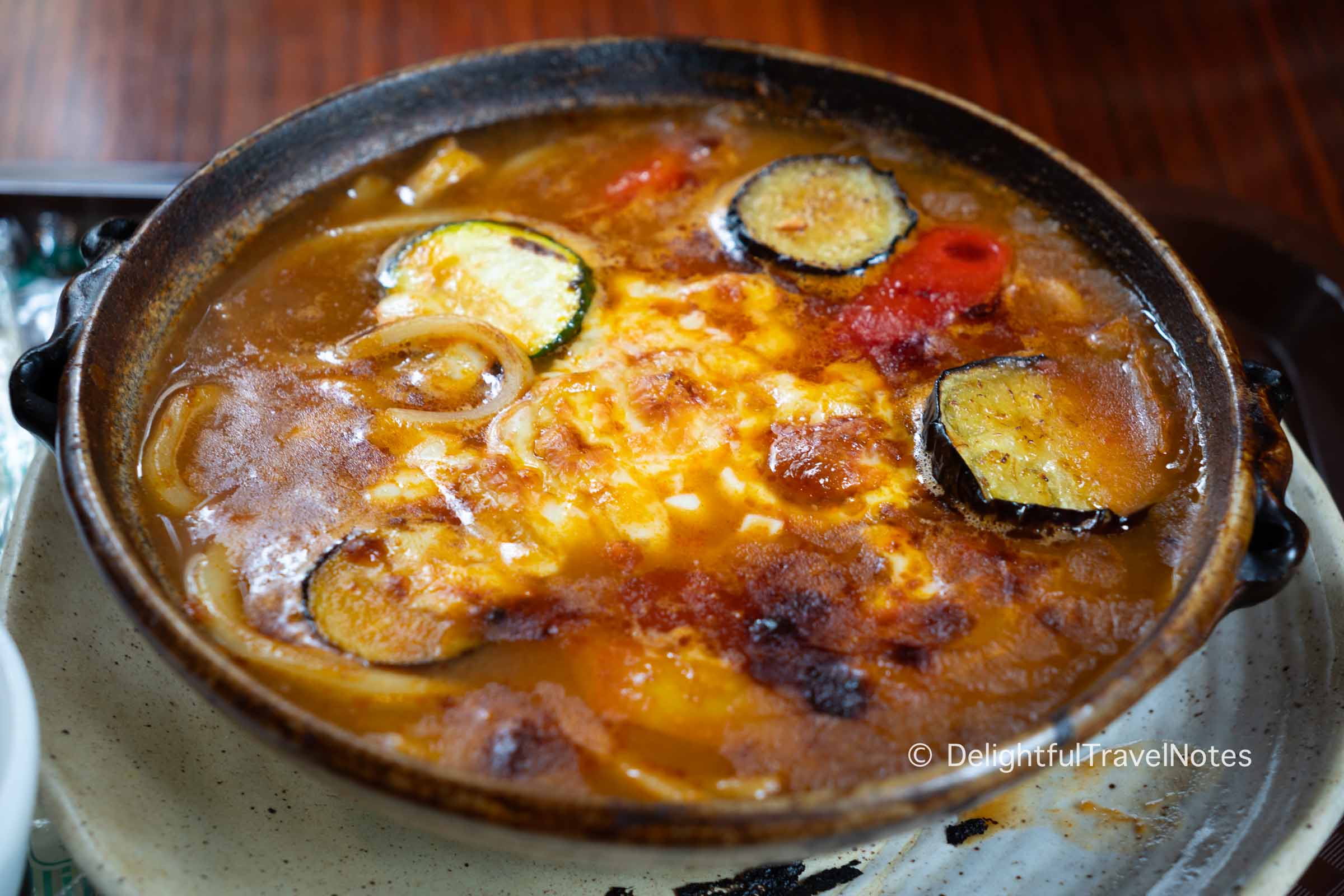
Arriving a little before 1 pm, we found the museum grounds to be beautifully landscaped. This is an exceptional outdoor museum nestled in the scenic hilly mountains of Hakone. It was so relaxing to view art sculptures while breathing in the crisp and fresh mountain air and enjoying the lush surroundings.
There are a lot of interesting pieces displayed outdoor. For example, this globe below reminds us of the Cloud Gate (aka the Bean) in Chicago.
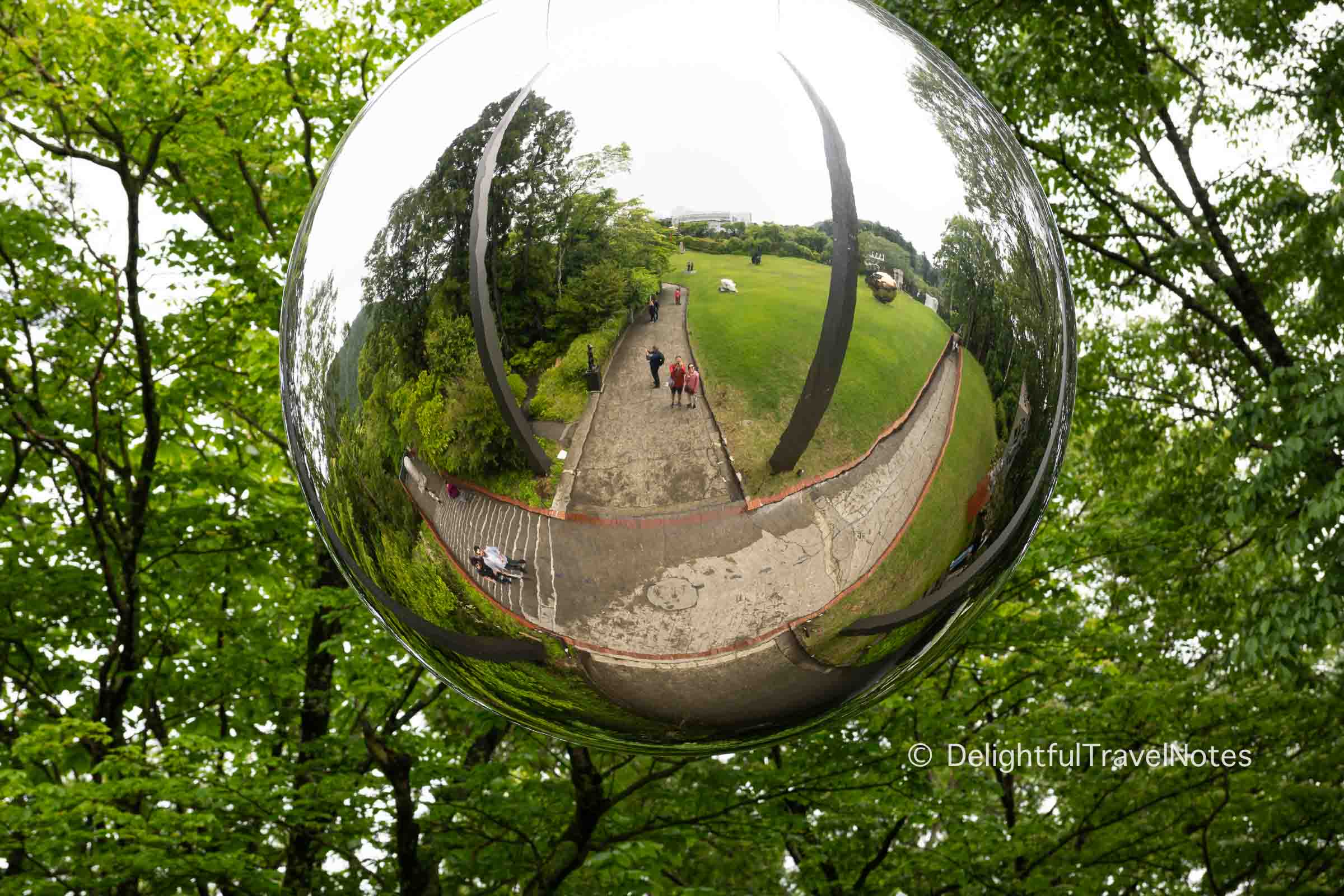
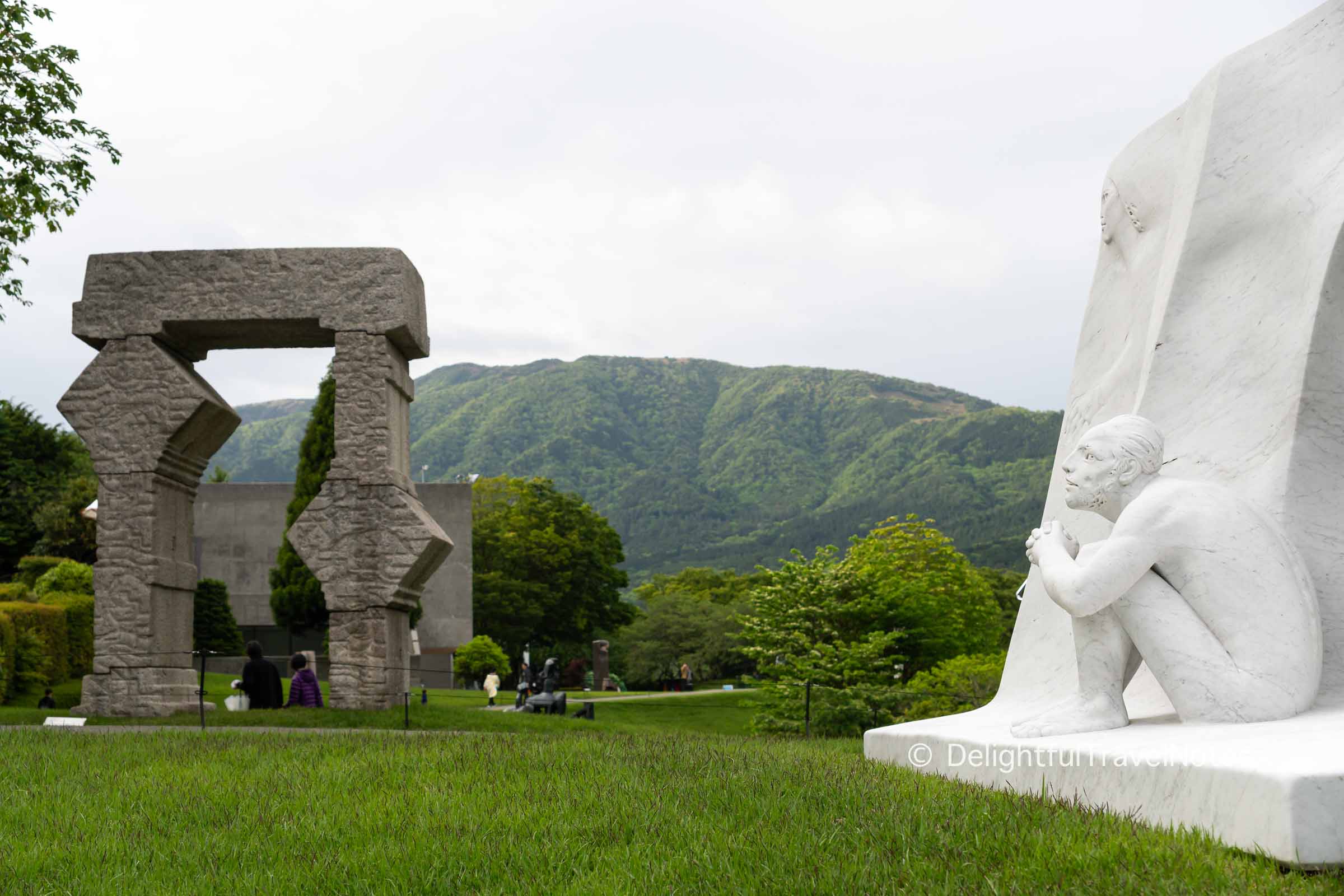
Among the museum’s highlights is the Picasso Pavilion, a dedicated space featuring over 300 works of the iconic artist, including paintings, ceramics, and sculptures. Another standout attraction is the Symphonic Sculpture, a colorful tower of stained glass where we could climb a spiral staircase, enjoying a kaleidoscope of colors.
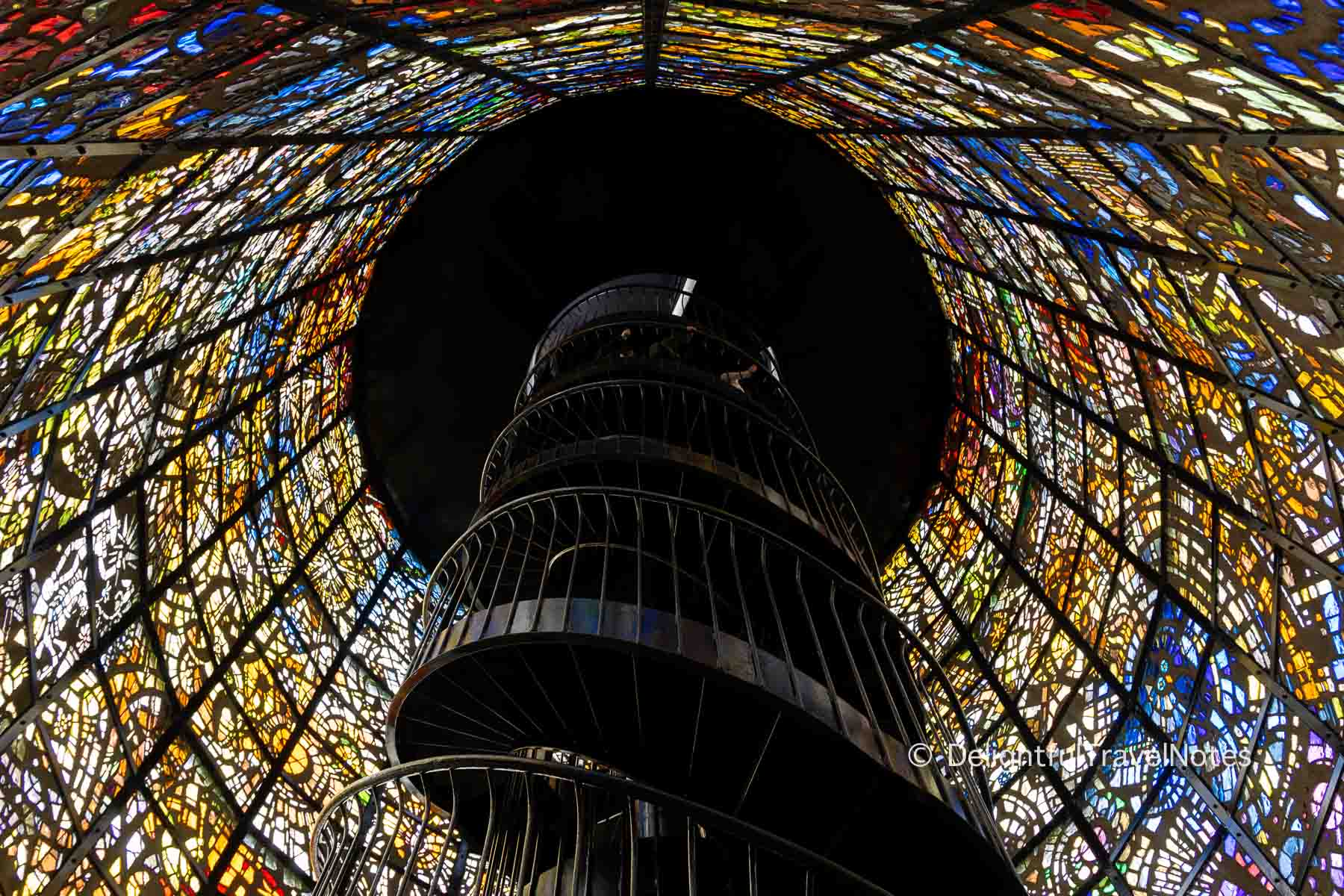
At the end of our visit, we tried the museum’s onsen foot bath. It didn’t really relieve much soreness from our feet, but it was lovely to unwind in such a picturesque and tranquil setting. We felt like there was not a single thing to worry about in that moment.
Overall, we spent about four hours exploring the Open-Air Museum, making it one of the highlights of our two days in Hakone. We strongly recommend this place for an immersive experience that blends the beauty of nature with the creativity of art.
Dinner and Rest
From the Hakone Open-Air Museum, we walked about 10 minutes to Tamura Ginkatsu-tei, a popular restaurant near Gora station, for dinner. We could order directly from an iPad, and the food came out pretty quickly. We tried tofu katsudon for the first time, and it was delicious. The tonkatsu was just okay though.
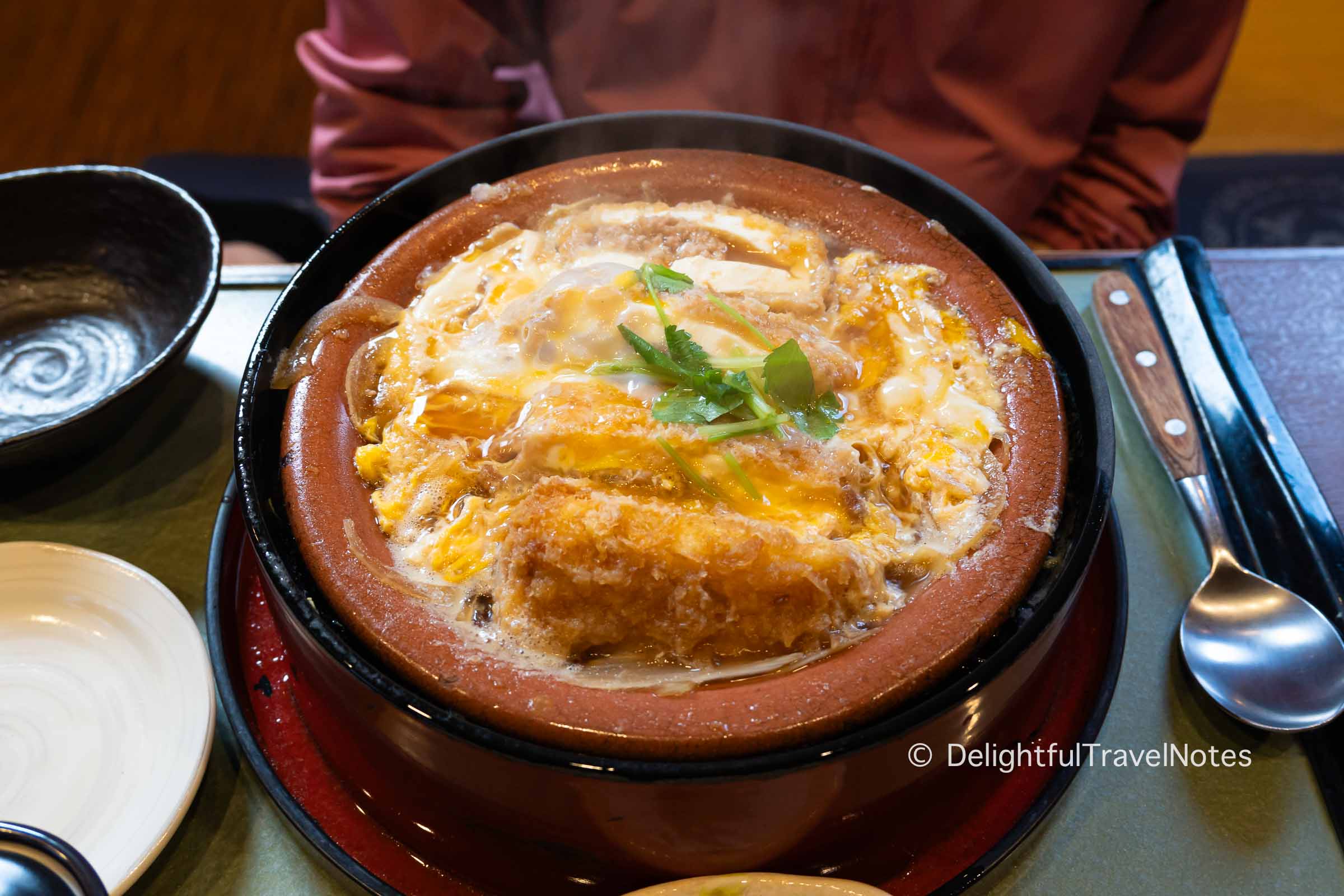
After dinner, we took a taxi back to the Hyatt Regency from Gora station. Our room on the fourth floor of the property was ready and it was very spacious. However, it seemed like it was time for some hardware upgrades. Long also went to the public onsen in the hotel. It was a bit far away from our room but well worth it for its spaciousness and the soothing ambiance.
Day 2
Breakfast
We initially had hoped for an early visit to Amazake Tea House, but failed since we aren’t morning people. Nevertheless, we woke up to find the sky was clear with the view of Mount Fuji afar from our window (just the very top part).
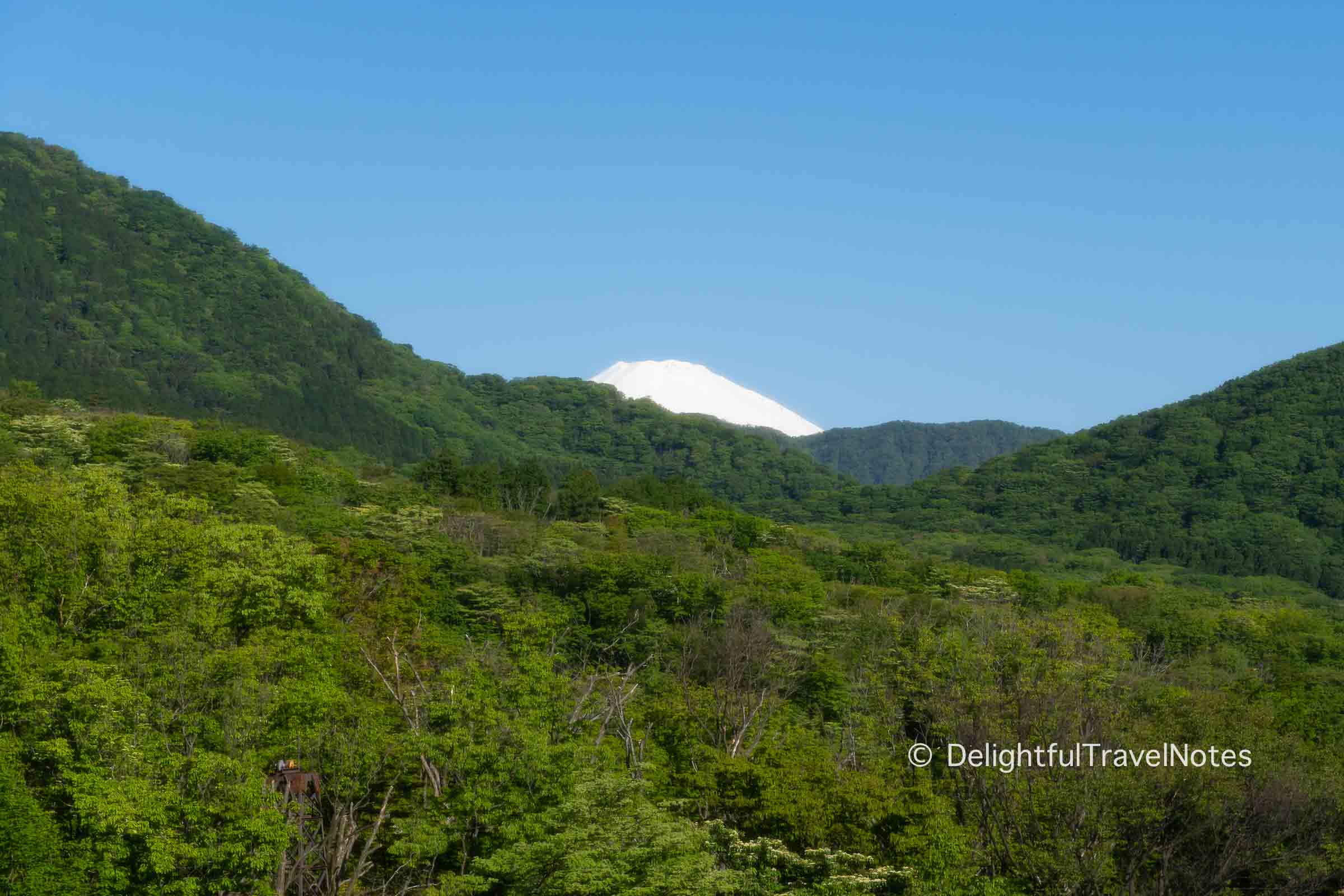
After an unremarkable breakfast with omelet and oatmeal at the hotel, we took a taxi to start our Hakone Loop visit at Hakone Shrine at 9 am. A side note about breakfast in Japan – we found Japanese breakfast to be much better and more interesting than Western options.
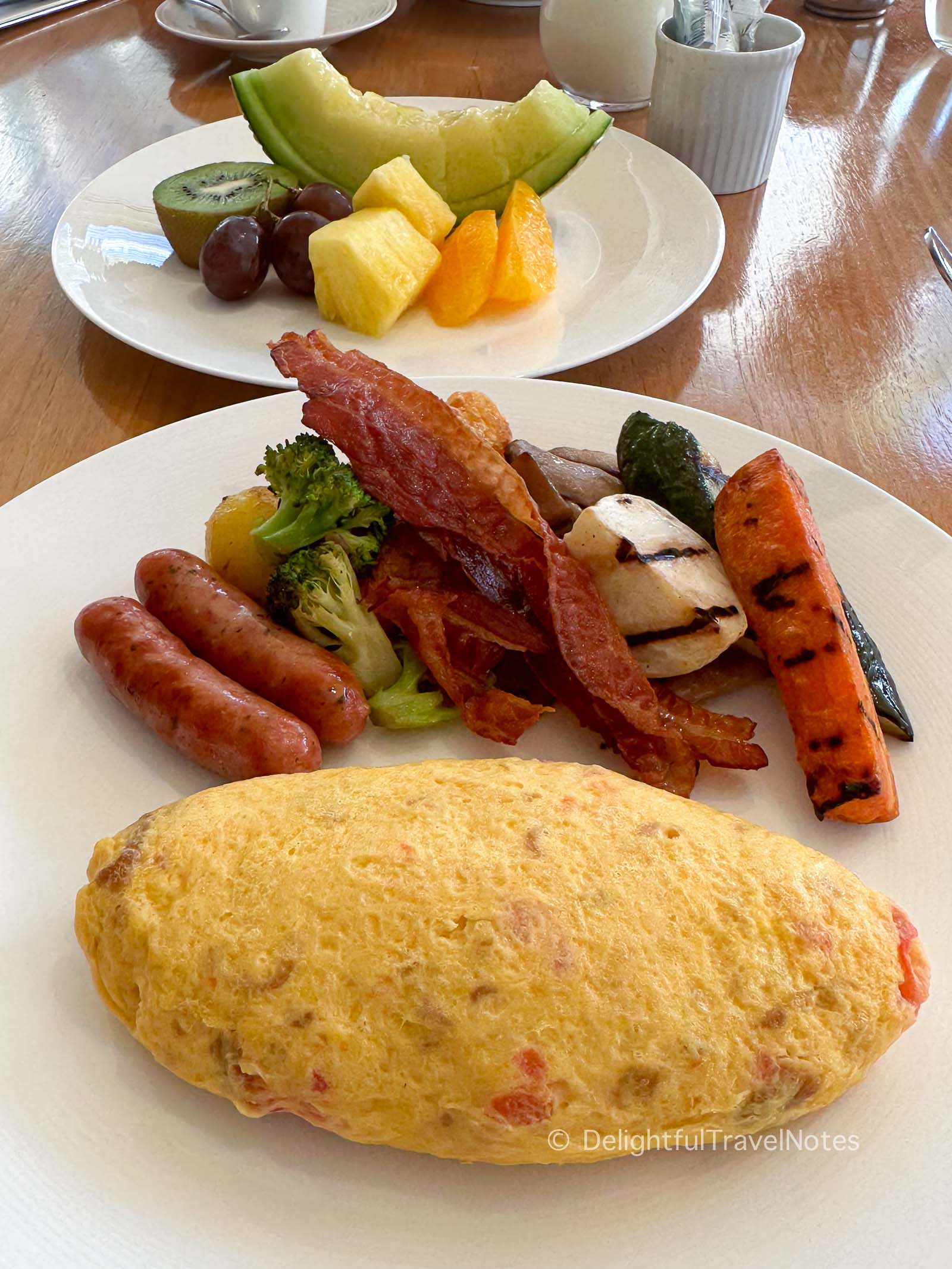
Hakone Shrine
The taxi ride to Hakone Shrine cost a little over 4,000 yen. We walked to the huge torii gate at Lake Ashi, where there was a short line for taking photos. The torii gate, partially submerged in water, was a stunning sight against the backdrop of the lake. After we took our photos, a large group of noisy tourists came and affected the serene atmosphere.
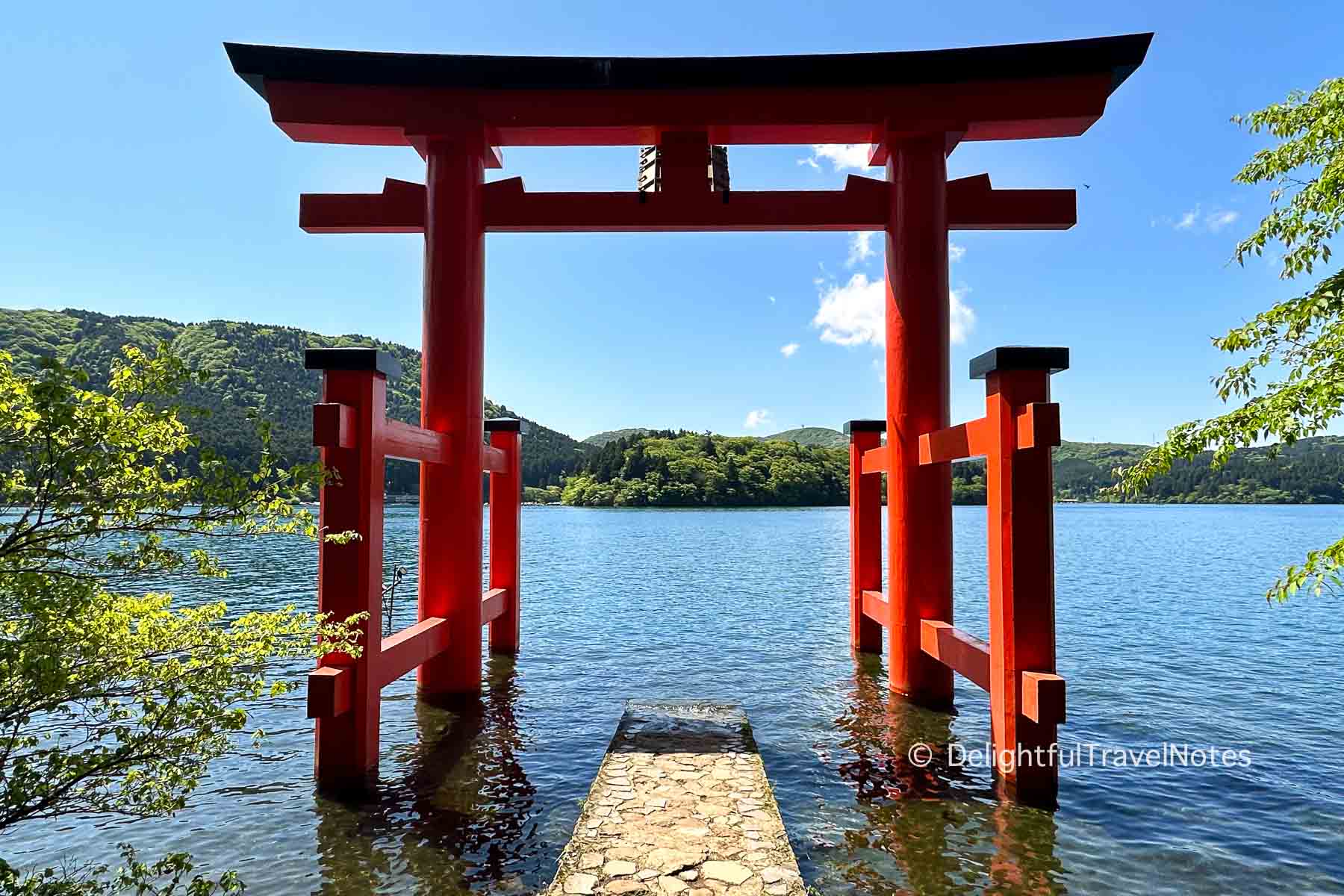
We continued our walk up to the main shrine, where we wrote our wishes on an ema and hung it up. Located in a dense forest, the shrine has a tranquil and spiritual atmosphere. We also collected a goshuin, a shrine seal stamp, before leaving.
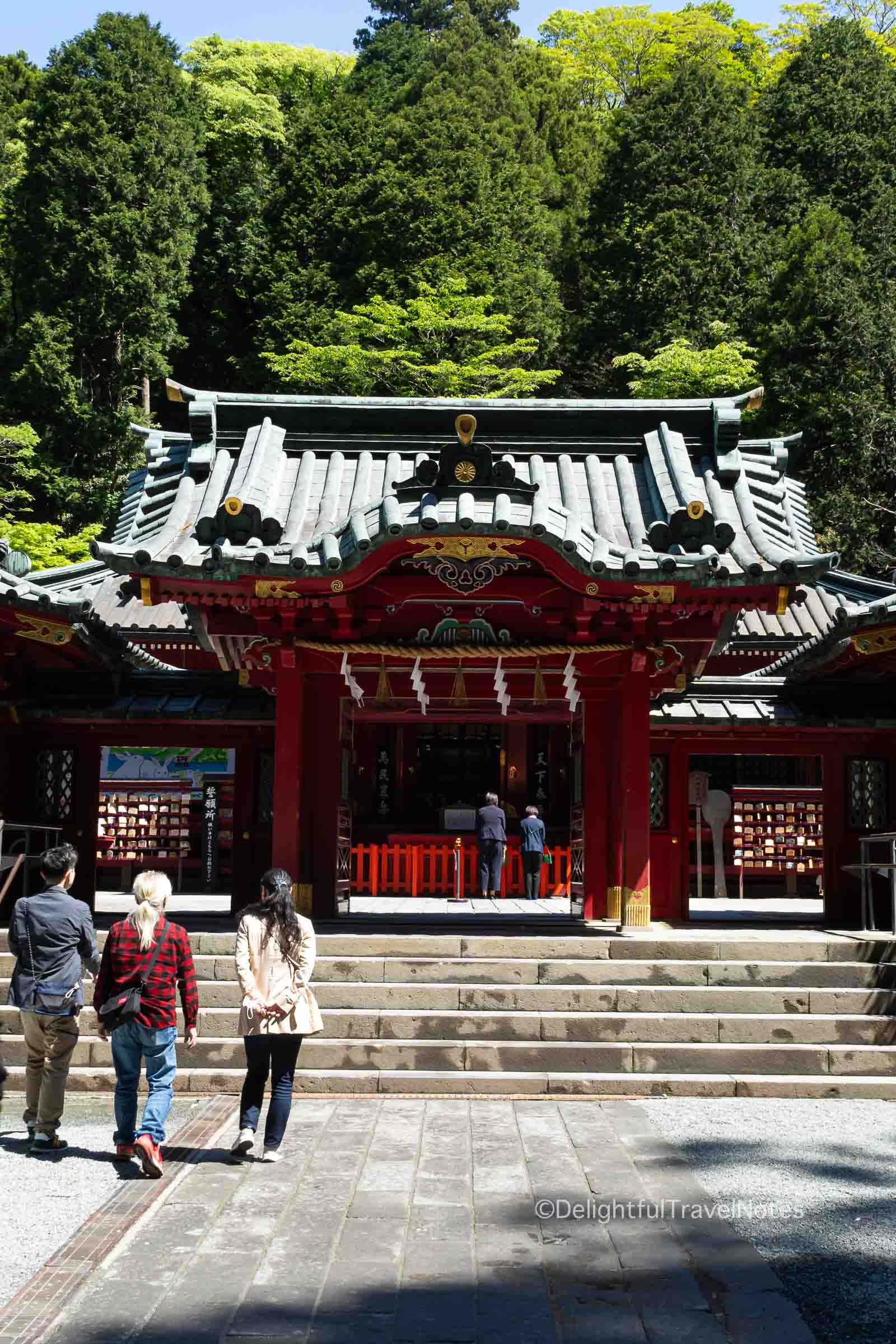
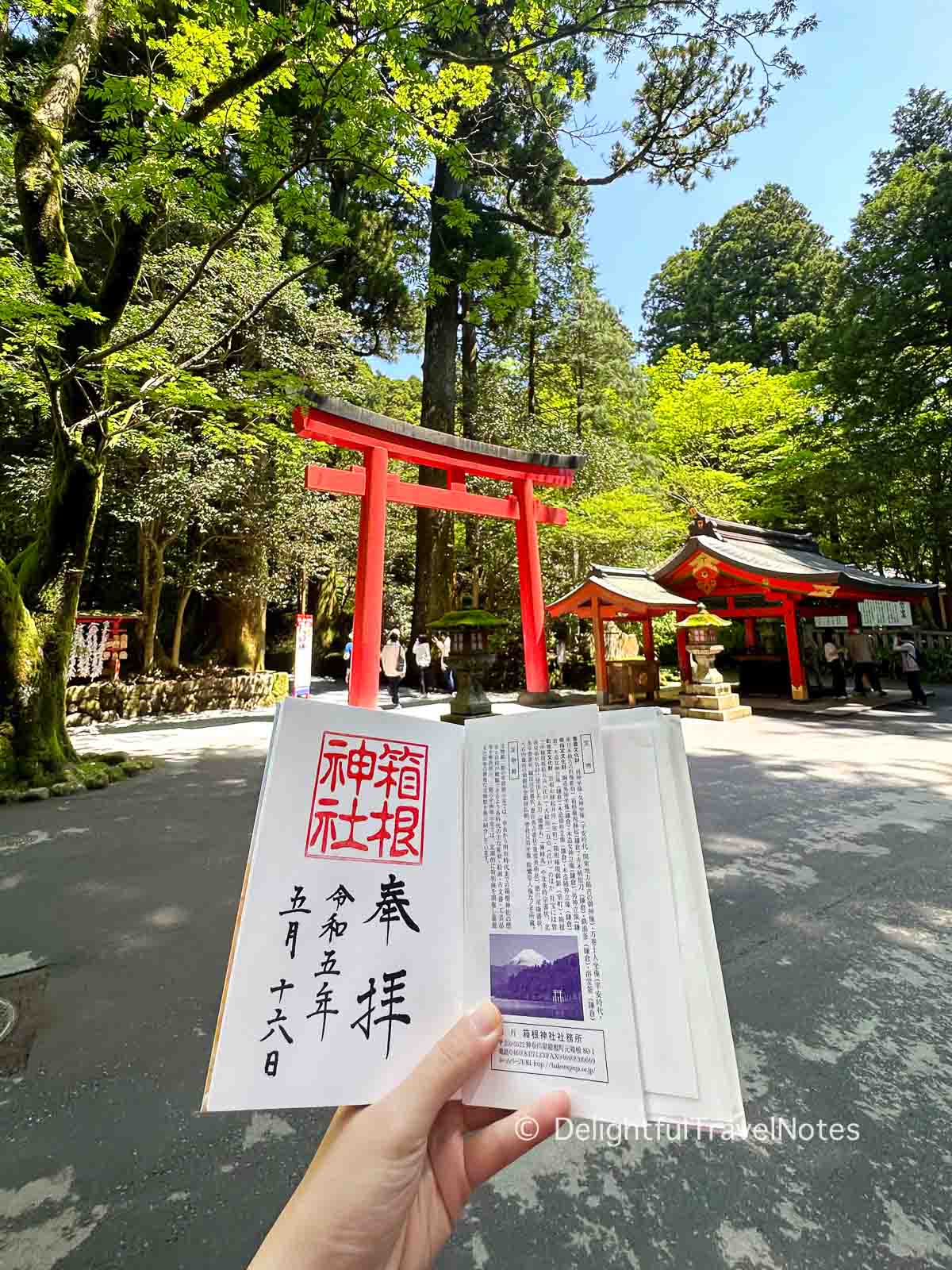
On the way out, we had a quick bowl of vegetable udon and mochi at a nearby shop named Gongen Karamemochi. It was pretty filling, and at this point, we felt like it was hard to have a bad meal in Japan.
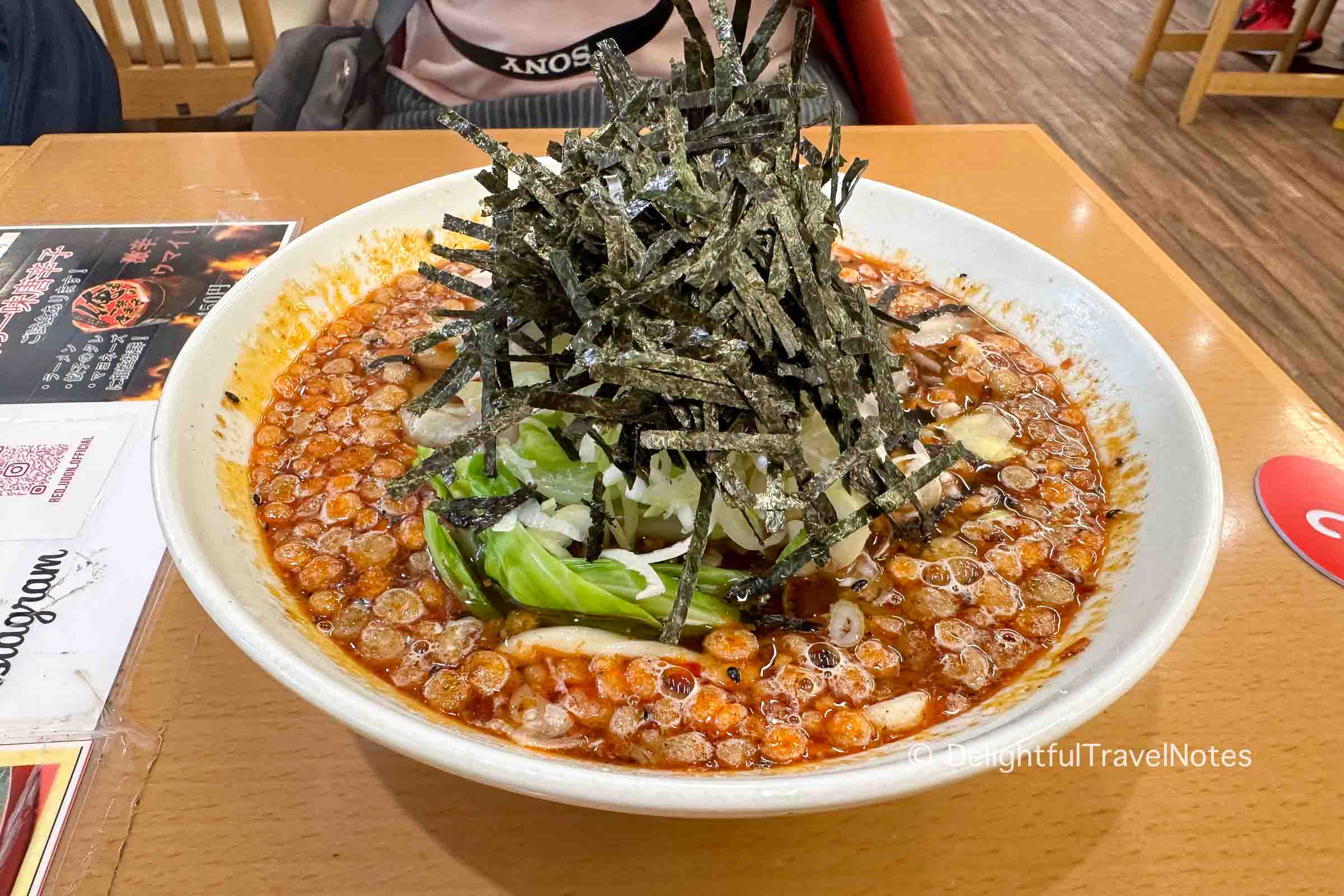
Narukawa Art Museum
We walked along Lake Ashi to reach Narukawa Art Museum. While small, the museum had a spacious outdoor terrace with a beautiful view of Mount Fuji, the Hakone Shrine torii gate, the Pirate Ship, and Lake Ashi.
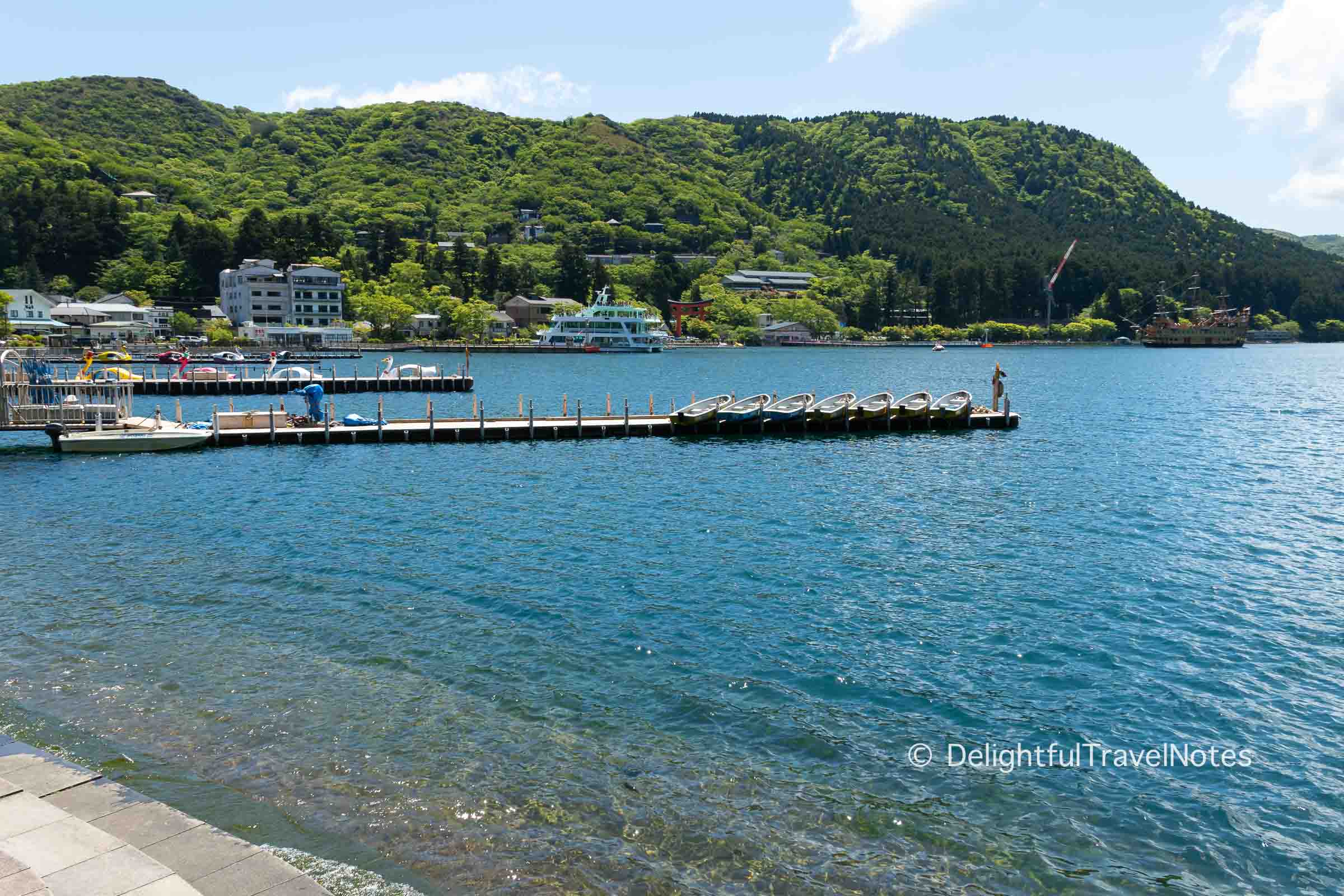
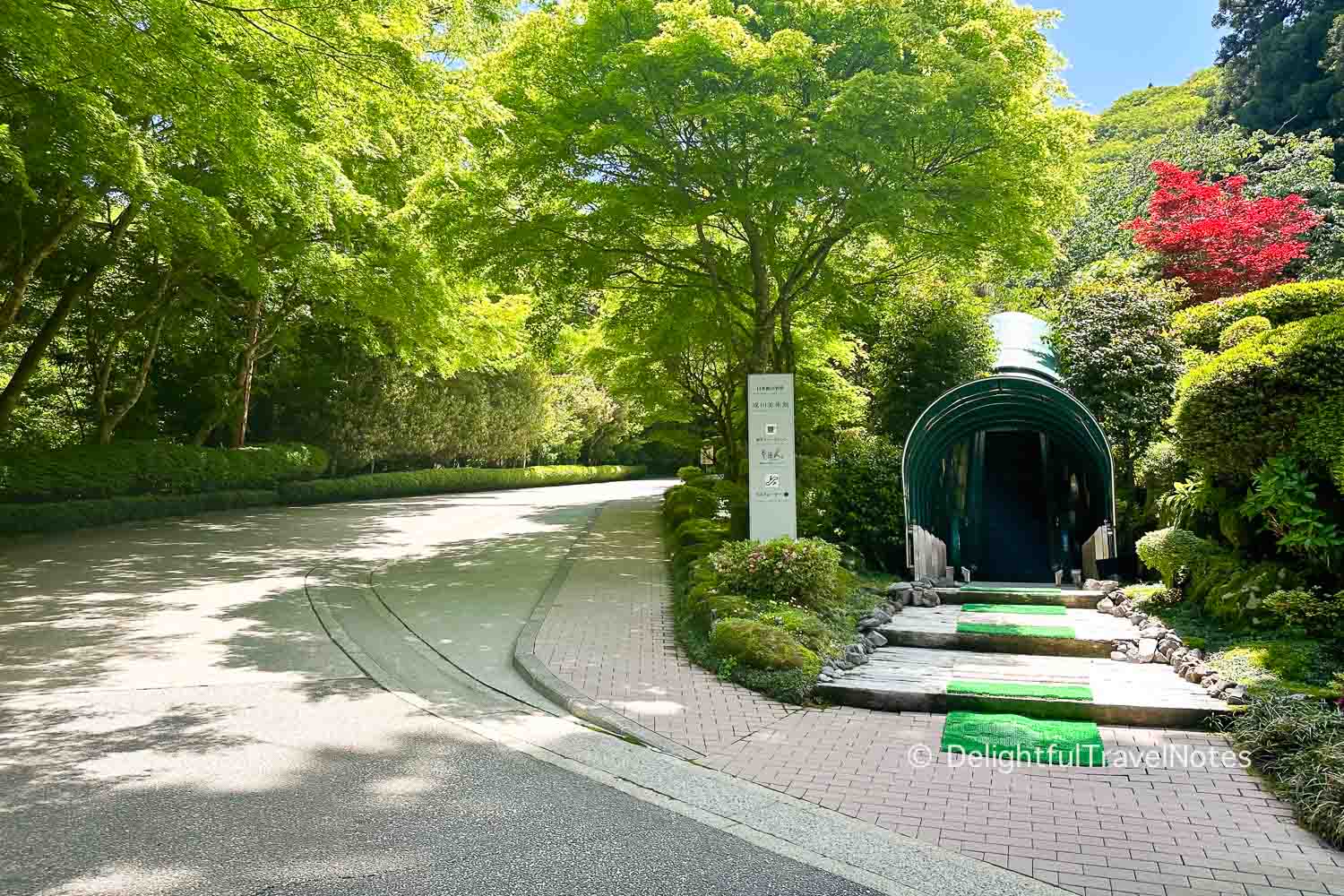
We were lucky to have clear weather with good visibility to view the iconic mountain. As a result, we spent quite a bit of time appreciating the scenery and taking photos. I think this is likely the place with the best view of Mount Fuji in Hakone.
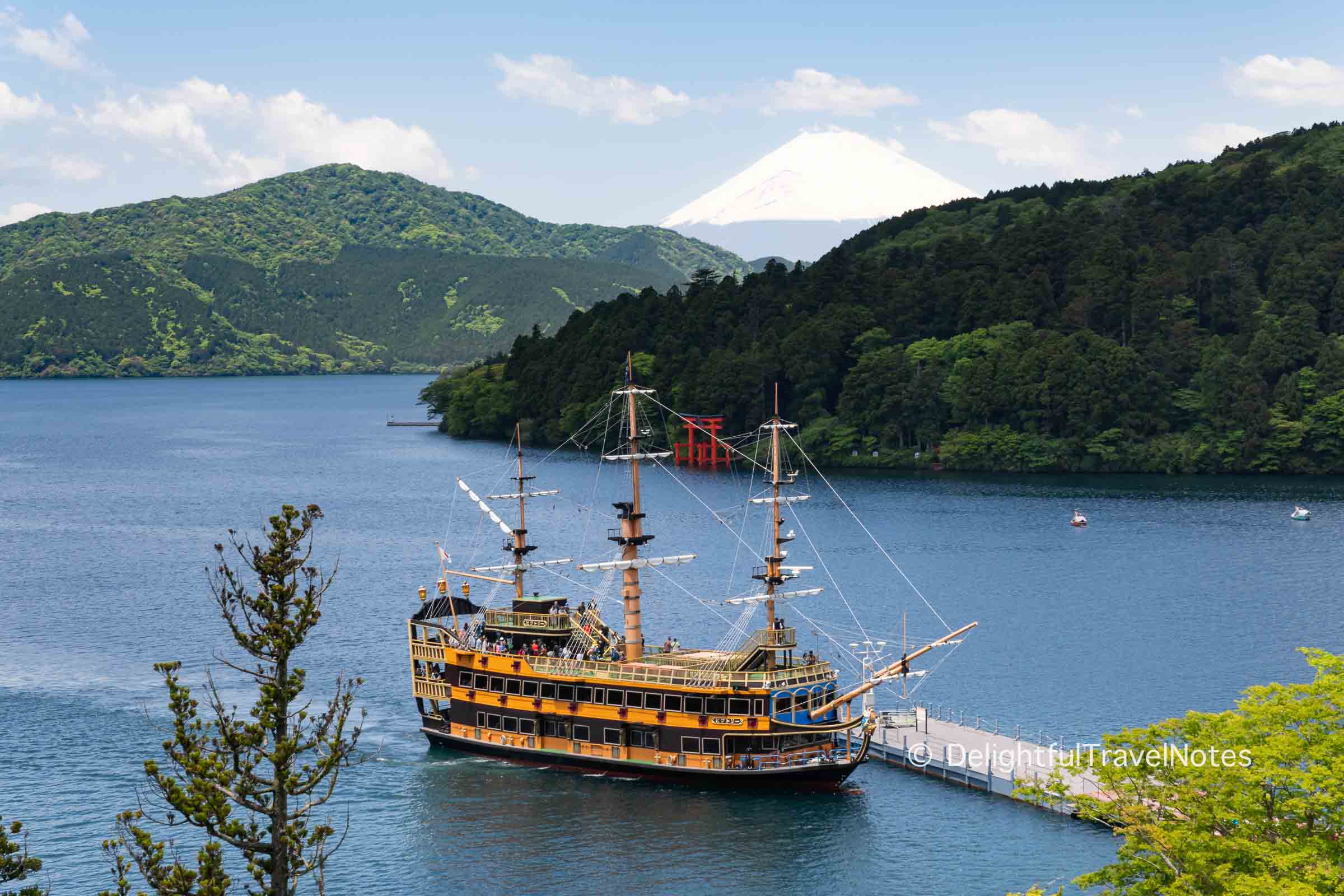
After enjoying the view, we turned to explore the museum. Narukawa Art Museum is well-known for its vast collection of over 4,000 works by modern and contemporary Nihonga artists. Nihonga art style is characterized by the use of traditional materials and techniques to create subtle textures and nuances of colors in paintings.
One of the highlighted exhibitions at the museum was of Fumiko Hori, a prominent Japanese artist known for her distinctive Nihonga paintings. Her paintings are very elegant yet impressive, showcasing the beauty of nature and Japanese culture, often depicting seasonal changes, flowers, and landscapes.
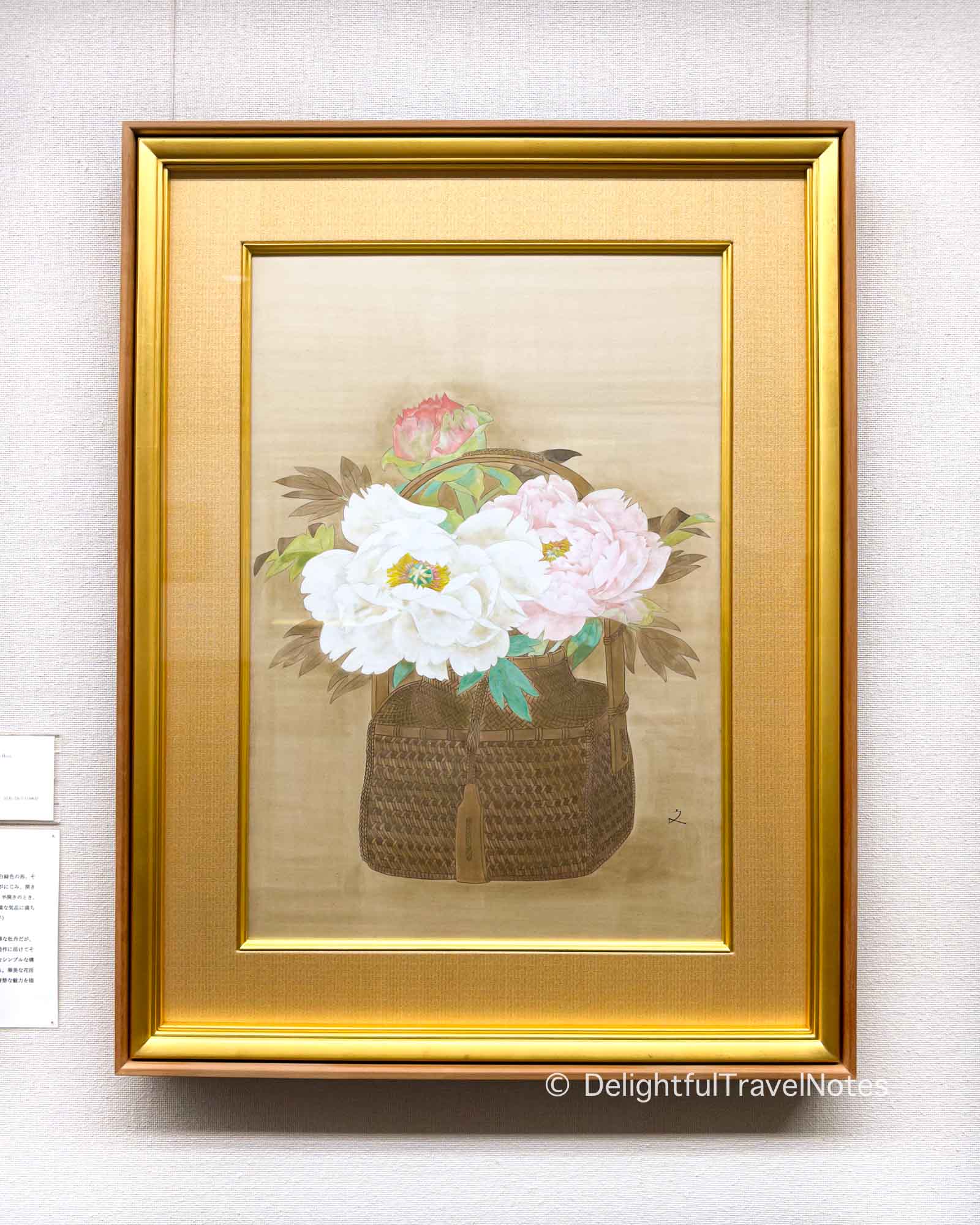
Some may consider the entrance fees for Narukawa Art Museum to be a bit steep, given the museum’s small size. We personally found the fees acceptable since we got to enjoy stunning views of Mount Fuji and learned about Nihonga art style. If you are into arts and museums, we totally recommend this place.
Pirate Ship and Cable Car Ride
Leaving Narukawa Museum, we bought premium tickets for the Pirate Ship. Those who purchase premium tickets will be able to board the ship first and enjoy more space on the ship. The line is also much shorter, so overall, we think the premium tickets are worth it.
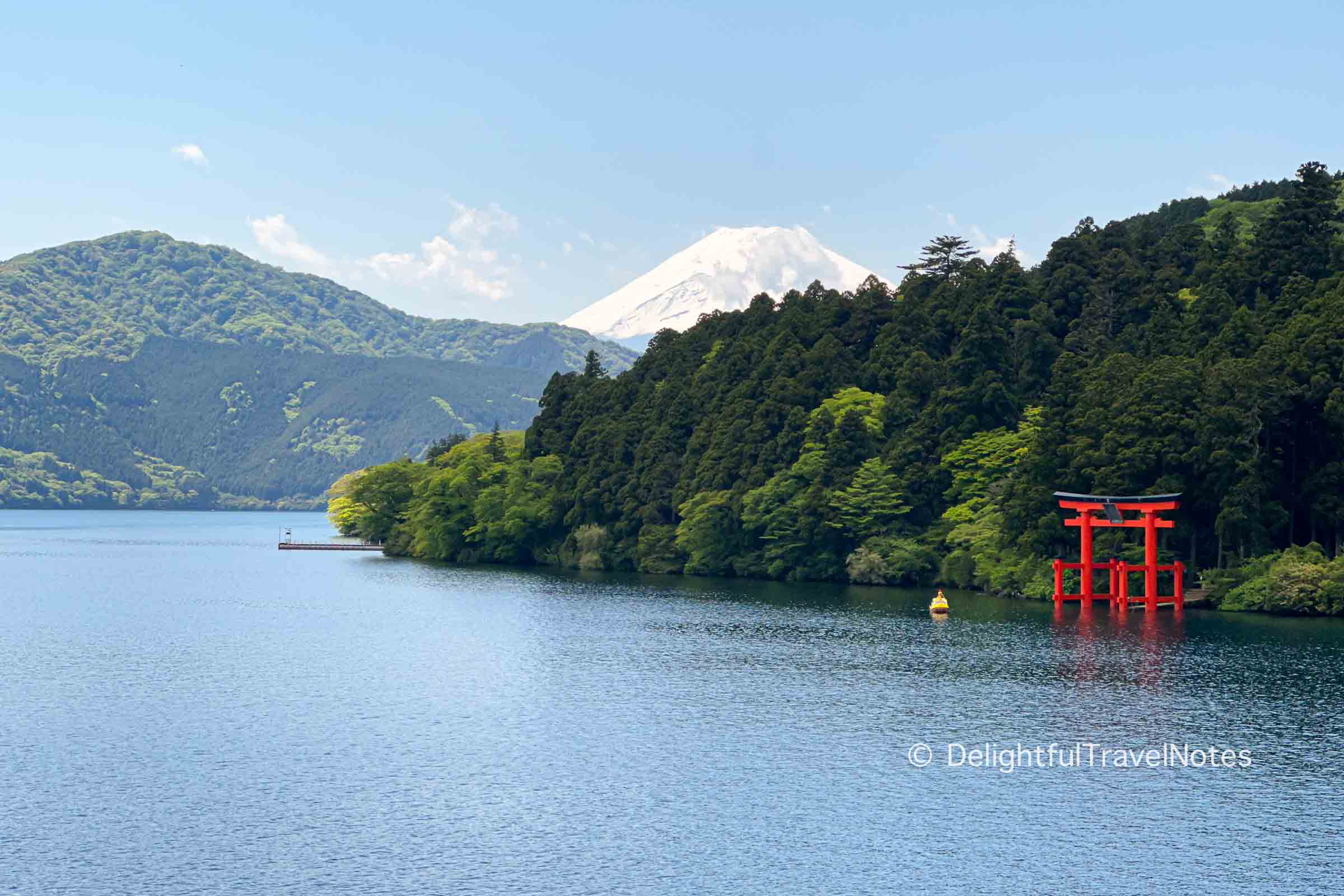
The ride was smooth, and the view of Mount Fuji from the ship was incredible on a clear day like this. It was a bit chilly on the open deck, but we enjoyed the panoramic views of the lake and mountains.
We transferred to the Hakone Ropeway at Togendai Port and headed to Owakudani, known for its active volcanic valley and hot springs. Both cable car stops were quite crowded, but the lines moved very quickly. The cable car ride provided us more opportunities to enjoy the view of Mount Fuji.
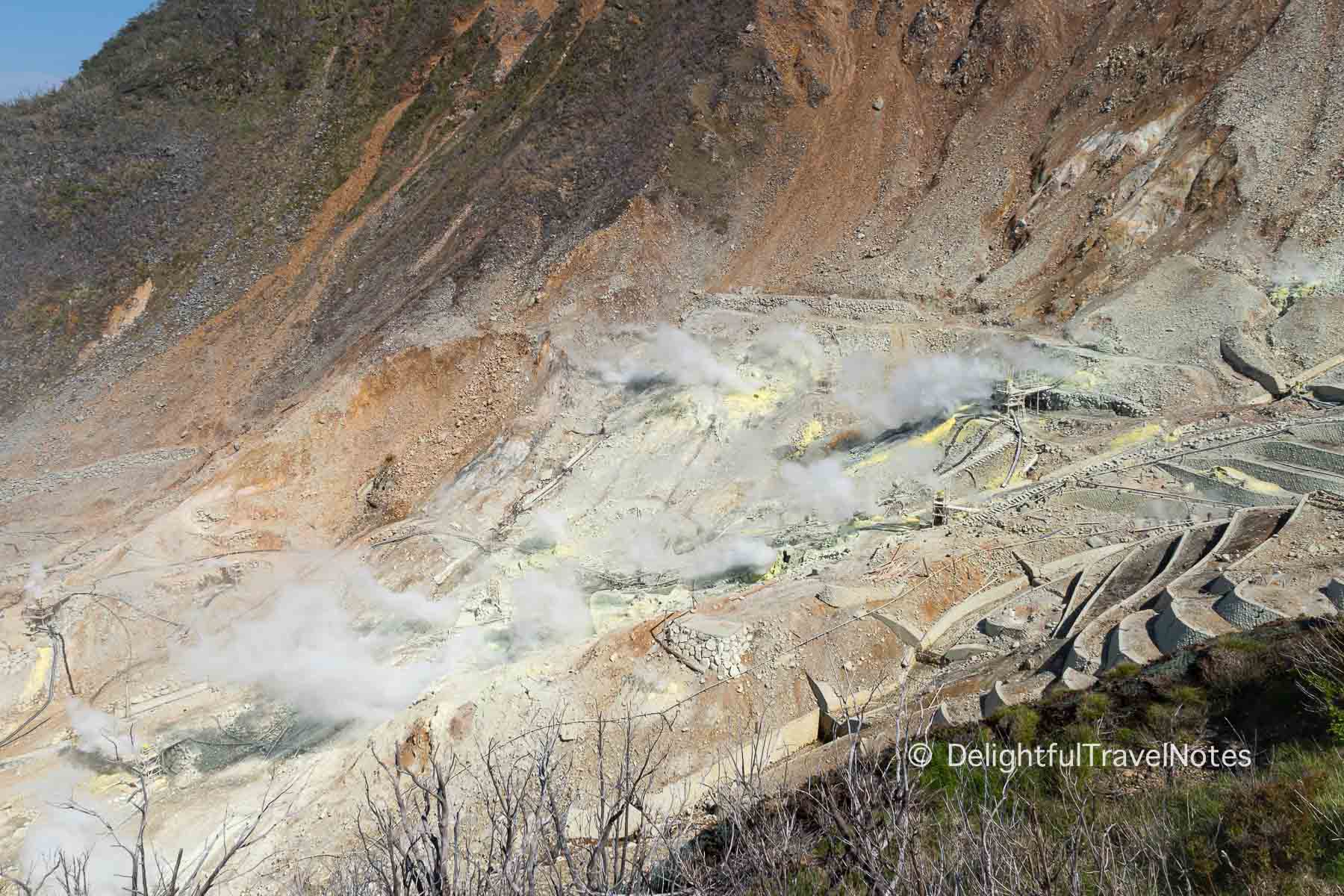
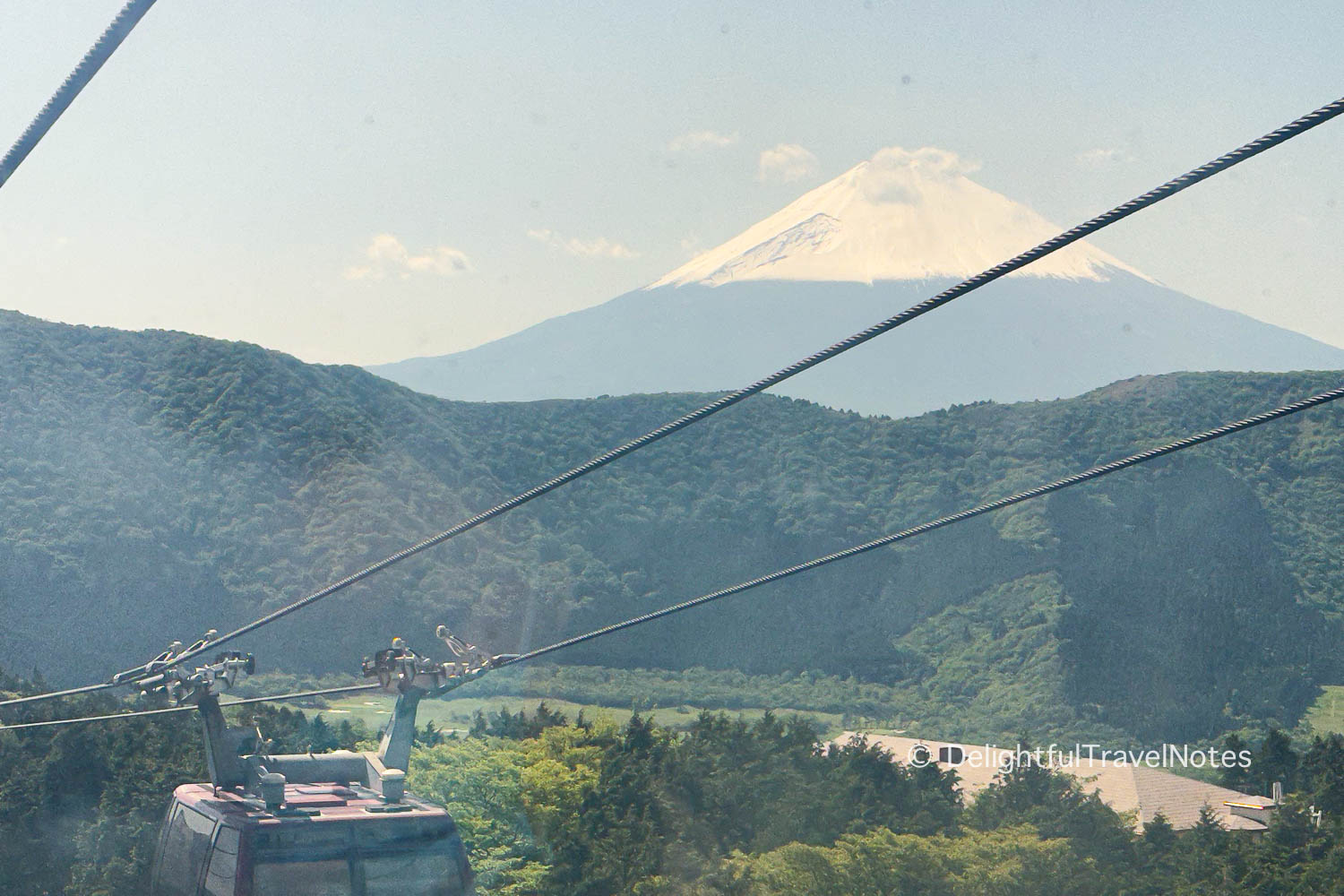
There was a strong sulfur smell in the air at Owakudani stop. We purchased some black eggs at a souvenir shop, a popular tourist activity. These eggs are boiled in the hot springs, giving them a distinctive black appearance. I think they tasted pretty similar to regular boiled eggs but had a slightly stronger flavor. We also visited Hakone Geo Museum briefly.
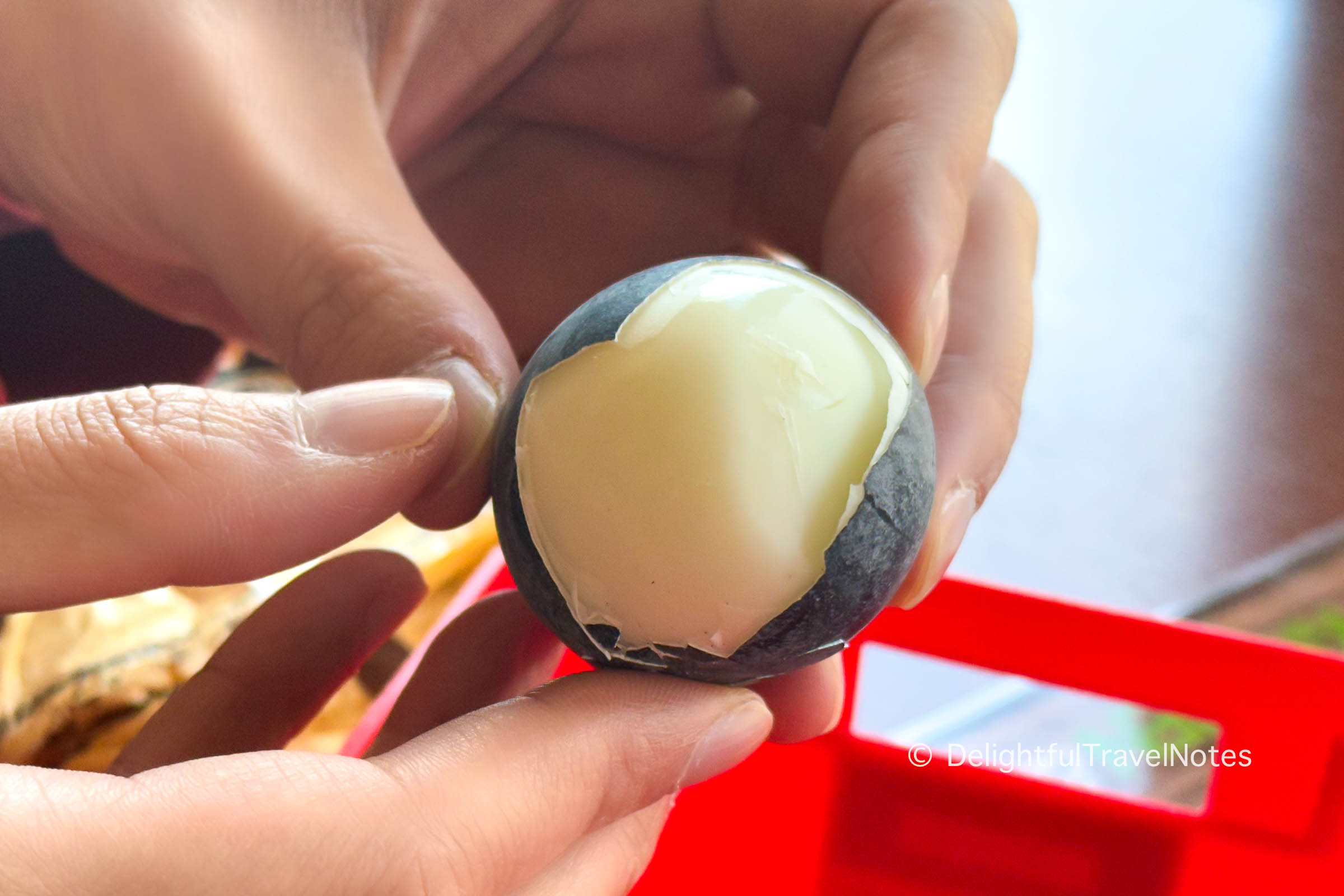
We continued on the ropeway and reached Sounzan station around 3 pm. Although the Hakone loop was enjoyable, if we had to choose, we would definitely prioritize the Open-Air Museum over the loop for a one-day visit.
Ryokan Check-in and Dinner
From Sounzan station, it took us 10 minutes to walk back to the Hyatt Regency to pick up our suitcase. Then it took us under 5 minutes to walk to Madoka no Mori ryokan, where we spent our second night. Since it was our first ryokan experience, we couldn’t help feeling excited. Here’s our shortlist of the best Hakone ryokan with private onsen.
At check-in, we were warmly welcomed by the attentive staff at Madoka no Mori. For the rest of the afternoon, we tried the private open-air onsen on the balcony, enjoying the view and the relaxing atmosphere.
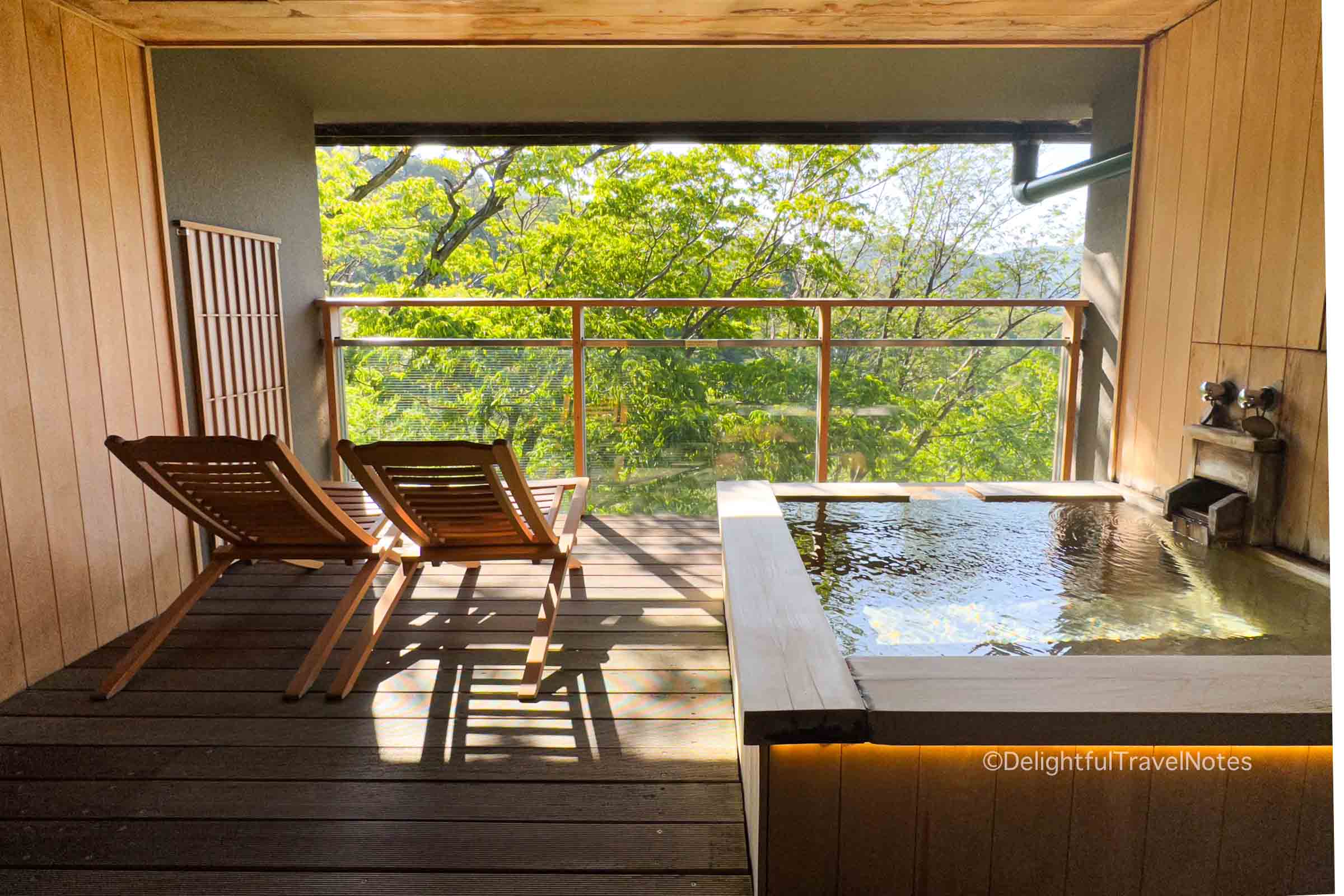
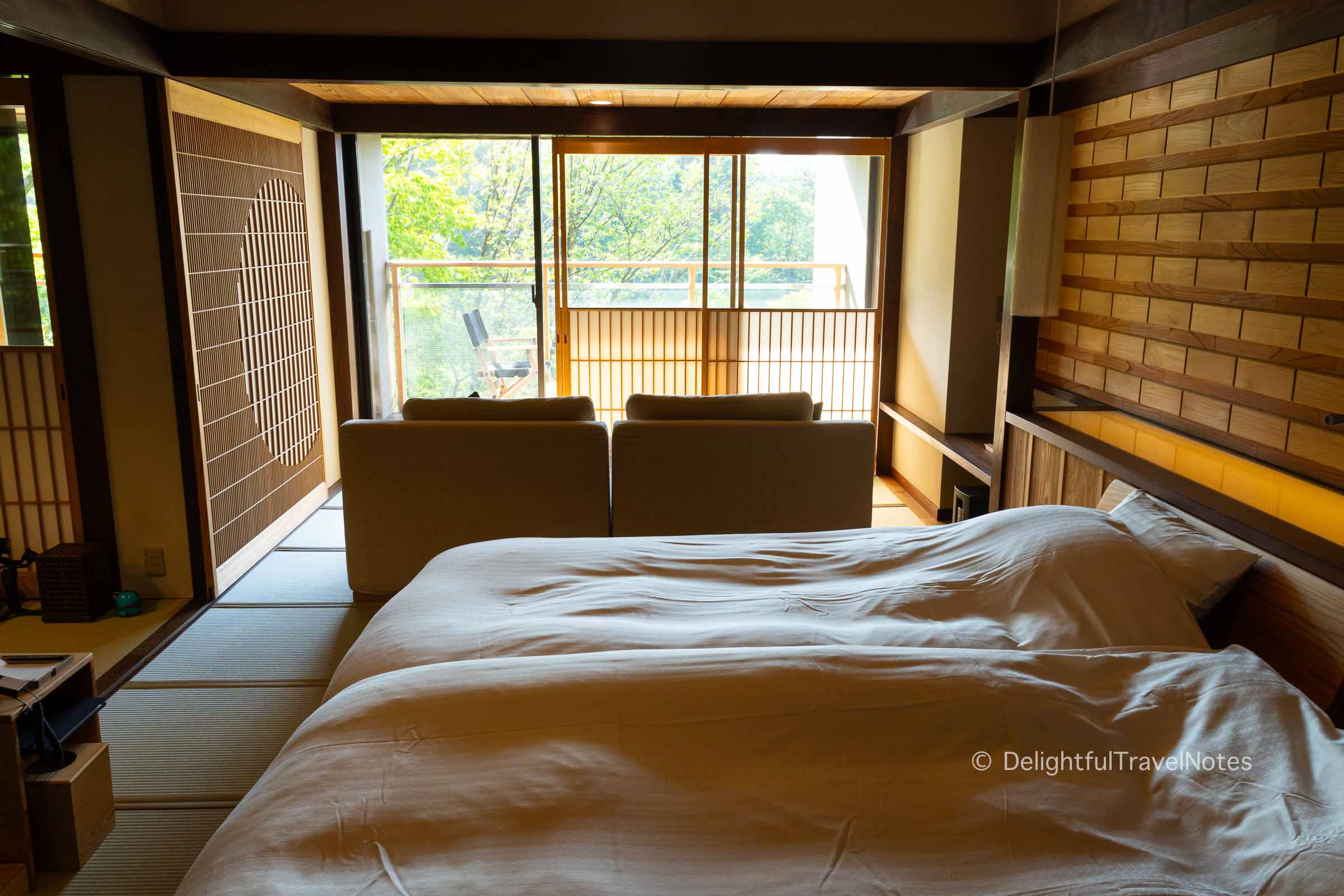
Then, at 6:30 pm, we headed to a private dining room in the ryokan for our kaiseki dinner. The dinner was what I had been anticipating the most for this stay after an excellent kaiseki meal at Hanasaki Manjiro in Kyoto a few days ago.
I had high expectations, and the food did not disappoint. Our dinner was exceptional! It was a feast of colors and flavors, featuring dishes such as poached tiger shrimp with assorted vegetables, suimono clear soup with fish, and Hida beef shabu shabu. You can read my review of Madoka no Mori ryokan with more information and photos of the accommodation and our kaiseki meal.
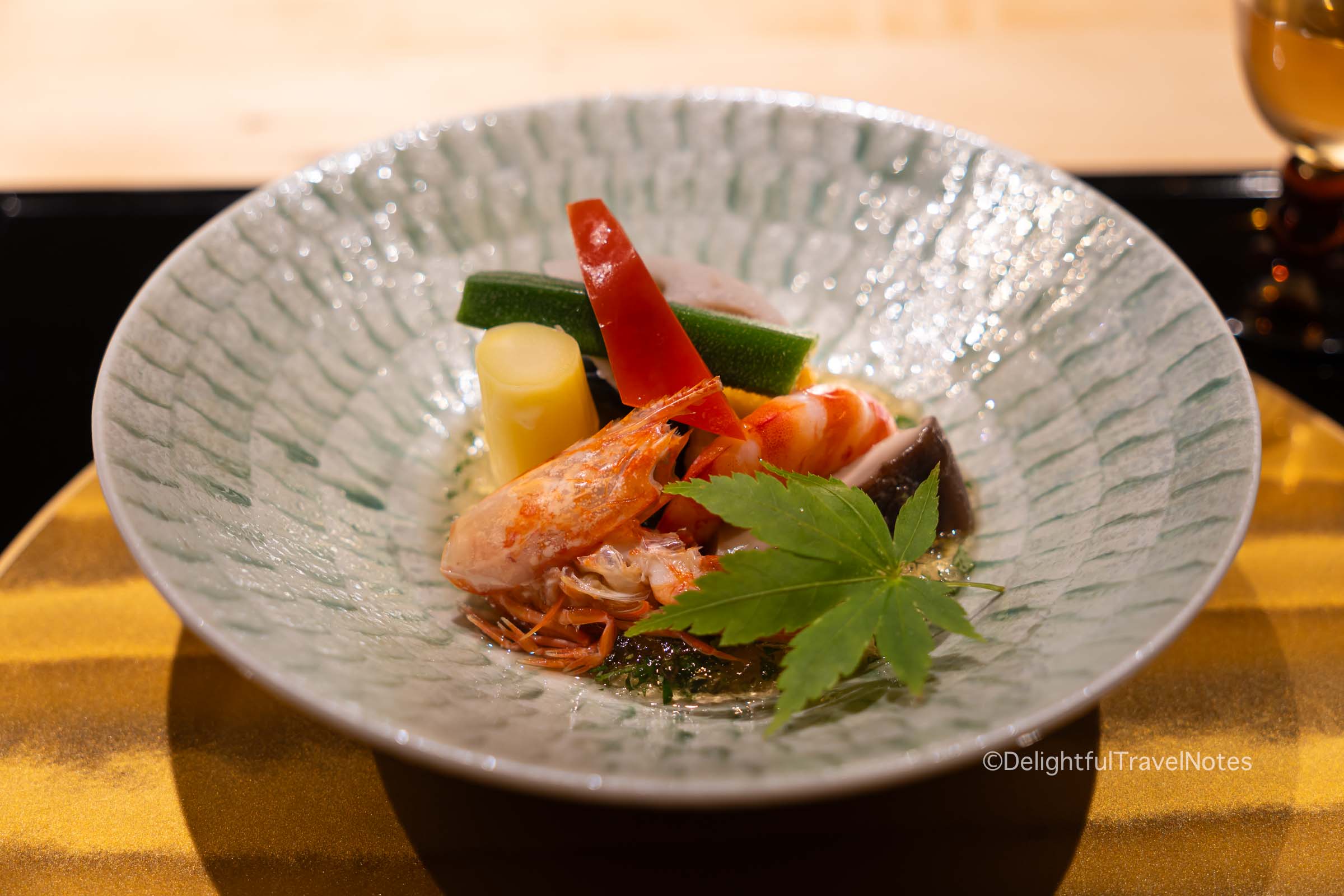
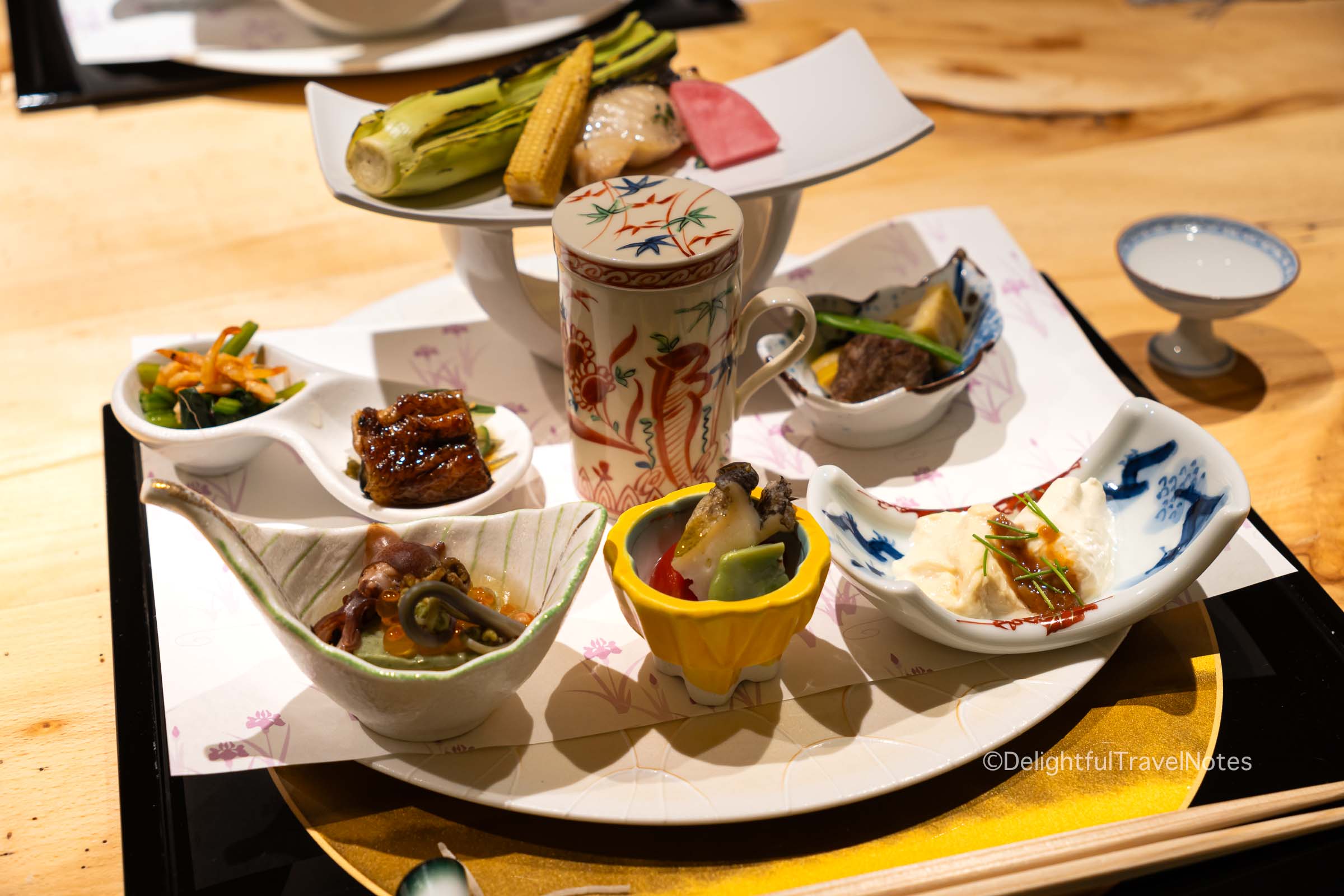
We were full, but it did not feel heavy. Day 2 in Hakone was filled with new experiences, making us deeply contented and satisfied. We went to sleep early and the bedding was comfortable.
Day 3
Onsen and Breakfast
We finally had a day when we could wake up late. I enjoyed the private onsen in our room while Long went to try the ryokan’s public onsen. They have several communal onsen baths with different temperatures in a beautiful and serene setting. After that, we went to our private dining room for breakfast, which turned out to be another culinary delight.
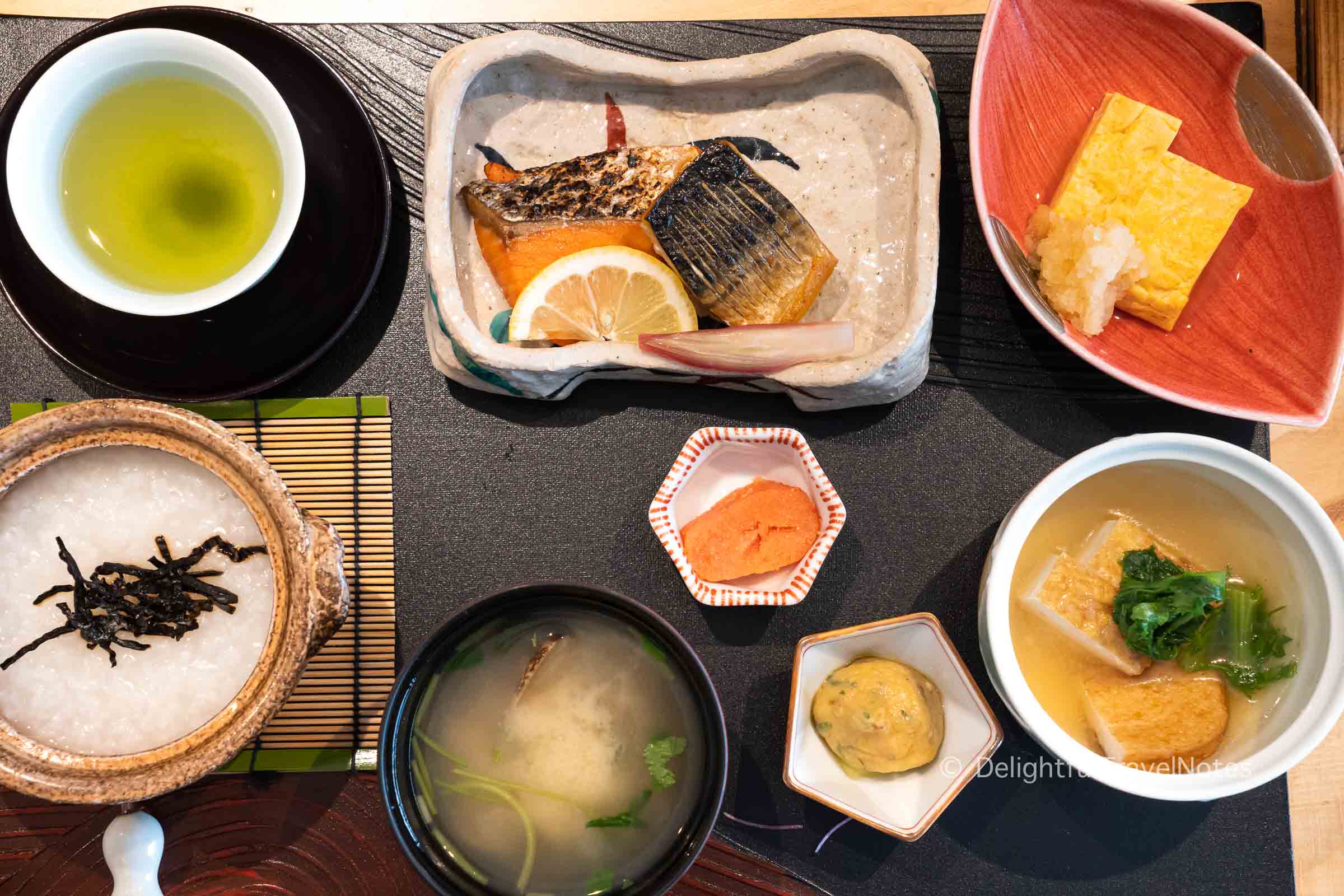
Our breakfast was excellent, with traditional Japanese dishes such as grilled fish, mentaiko, clam miso soup, and tamagoyaki. Every dish was executed very well and utilized fresh, quality ingredients. Again, you can read my review for more detailed information.
Departure
After breakfast, we wandered around the ryokan and took some time to relax with the massage chairs. It was very quiet both inside and outside Madoka no Mori ryokan.
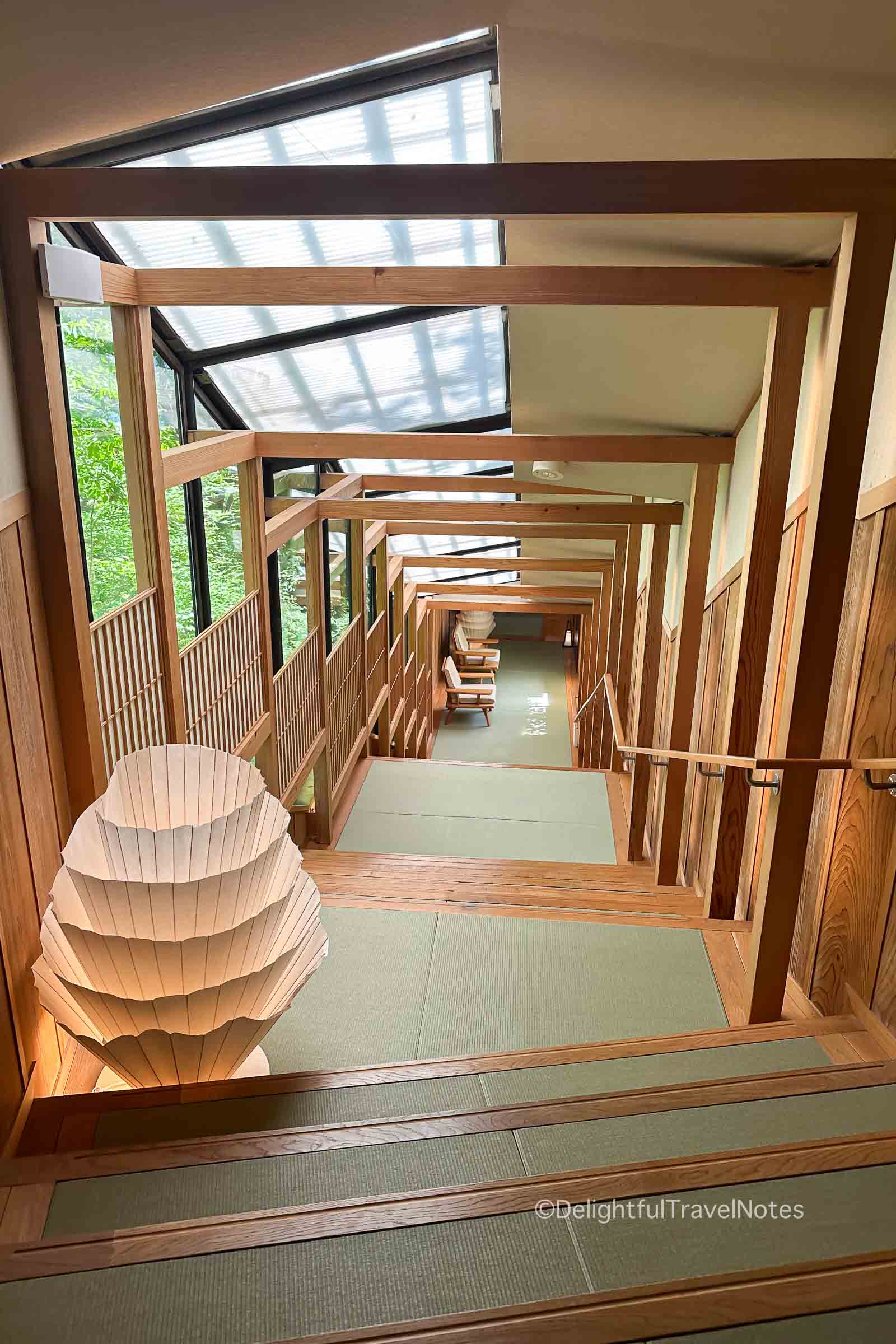
We requested the staff to reserve a taxi for us in advance. At 11 am, we departed for Odawara station and boarded the Kodama shinkansen to Tokyo. We left Hakone with so many fond memories.
Travel Tips and Takeaways
Overall, our two-day trip to Hakone was amazing beyond our expectation. The weather in May was perfect for outdoor activities and onsen relaxation, with temperature hovering around 15°C. Here are the highlights and takeaways from our trip:
- There are different areas to stay in Hakone. We drove by Hakone-Yumoto and found it a tad busy for our liking. On the contrary, Gora offered a more serene and secluded ambiance, which aligned more with our preferences.
- Hakone area can be pretty hilly in some places. You definitely should try to travel light. Consider using a luggage forwarding service and perhaps only bring a carry-on for your visit.
- We loved the Hakone Open-Air Museum. The Pirate Ship and Owakudani were fun, a little touristy though. However, our top recommendation would be the Open-Air Museum if time was limited.
- When in Hakone, it is a must to experience a stay at a ryokan with kaiseki meals. Book as early as you can since Hakone is very popular with both domestic and overseas tourists.
- Taxis in the Hakone area can take quite some time to arrive. Therefore, it is best if you reserve in advance.
- Hakone has a lot to see and do. I think it deserves more time than just a day-trip from Tokyo.

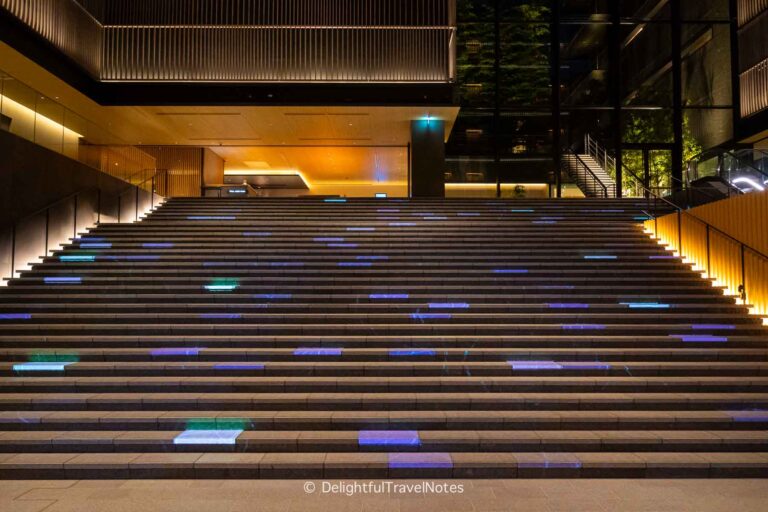
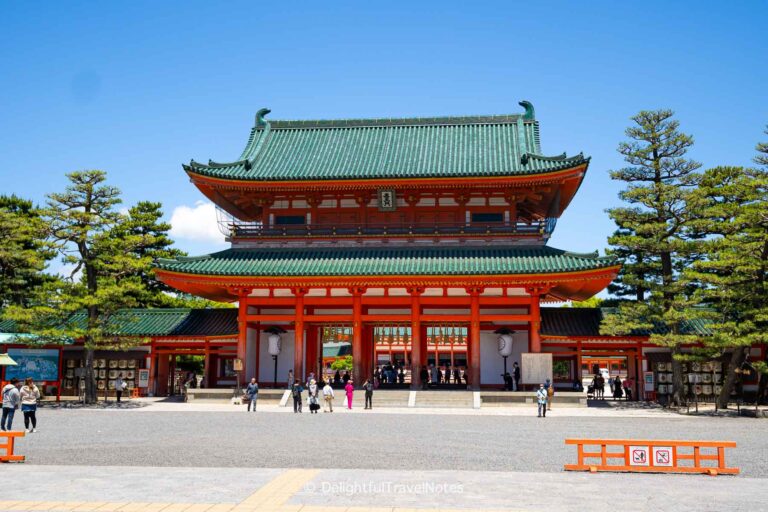
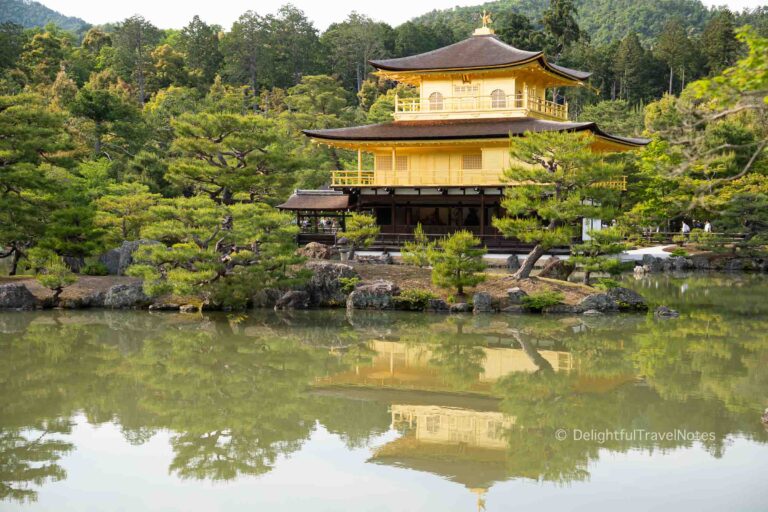
Such a helpful post! My husband and I are headed to Japan in March and planning to visit Kyoto, Hokane, and Tokyo. I’m a vegetarian, so the ryokan you stayed at won’t work for us (it notes that they cannot accommodate vegetarian), but I booked at one of the others you recommended that has a private onsen. Really looking forward to our trip and to checking out more of your posts as we plan. Thank you!
Hi Alicia,
Thank you so much for leaving me a comment! I’m glad you found the information helpful. In case you haven’t come across this, I read that some visitors use the Happy Cow app to locate vegetarian restaurants when traveling in Japan. Have a wonderful trip and I will be more than happy to hear about your experience!
Which timeframe did you visit Japan
I did this Hakone trip in mid-May last year.
Hello. Thanks for sharing this trip and it is well detailed. I just have one question, did you use a luggage forward service to transfer the luggage from Kyoto to your Tokyo hotel? Could you share the details. We are confused if we should head to hakone directly from Kyoto or plan in between our Tokyo 7 nights.
Thanks
Hi Umang,
Yes, I did use Yamato luggage forwarding service to send my suitcase from Kyoto to Tokyo. It was a very easy process. We told the hotel staff in Kyoto and they helped us fill out the transfer form. Then we simply paid in cash and dropped an email to our Tokyo hotel informing them ahead. From my experience, some hotels even call the next hotel to confirm the reservation while some don’t. It may cost around 3,000 yen to ship from Kyoto to Tokyo – I can’t remember the exact amount. I just sent one from Nara to Kyoto last week and paid 2,100 yen. Hakone is quite hilly so I highly recommend using this service.
I feel like it makes more sense to do Kyoto – Hakone – Tokyo than breaking up your Tokyo nights. Less train trips, less check in and out of accommodation.